

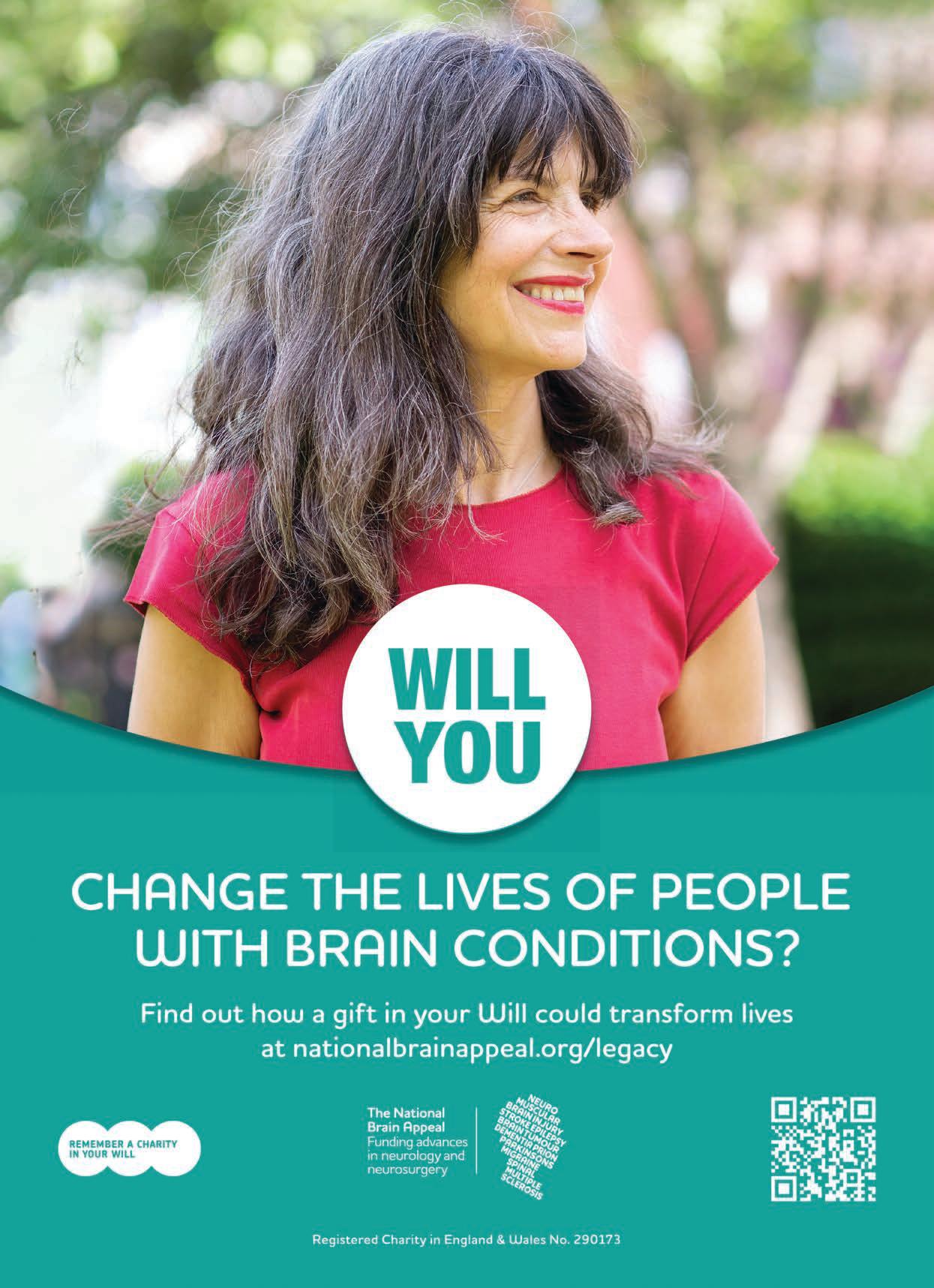
To most of us interested in the preservation of the English language ‘as she was spoke’ the introduction of yet another portmanteau word is likely to induce fits of screaming. Yet the proposal from legacy administrators that dictionaries adopt their term to describe the selfless act of leaving a gift to help others after one’s death seems charmingly apt.
Willanthropy – a contraction of ‘philanthropy’ with ‘will’ –gets my vote for a new term. I won’t, however, be buying a new collection of dictionaries if the proposal is adopted.
• The whole idea of the new term is, of course, a promotional effort to increase the number of wills containing charitable bequests. The big annual push takes place every September, when Remember A Charity Week takes place. The campaign doesn’t just encourage the public to leave legacies: it also aims to persuade lawyers and other professional will-writers to raise the possibility of a legacy with clients when generating a will.
• An inquiry by the Competition and Markets Authority has brought to light the fact that will writing and the newcomer to the market, pre-paid probate services, are as vulnerable to mis-selling as other elements of financial or legal services. Fortunately, there are certification



bodies consumers can turn to for reassurance.
• One of the financial issues that concerns many people administering the affairs of deceased loved ones has been Inheritance Tax, or IHT. It is an area where the Tories feel they can garner support from the wealthy South by its abolition – as 50 MPs who have expressed their support for such a move demonstrates. There is another side of that coin, however, as expressed by the charity umbrella Remember A Charity. They point to the advantages of leaving a legacy from the IHT perspective. It’s an ill wind!
• Financial uncertainty is affecting all areas of charitable work. One disappointing statistic that has come to light is the fact that, over the past decade, the funding provided to charitable causes by the country’s most successful companies – the FTSE 100 – has actually fallen. True, the figure has remained steady over the past six years, but given the recent hike in inflation that still represents a real cut.
• The whole charity sector in Scotland has been going though a process of reform: a process we have been following over the past year or so. That process is now complete, and the Charities (Regulation and Administration) Bill has become an Act, following Royal Assent.



3 3 Charitable
CONTENTS 13 21 37 7 Legacy excellence conference returns online 9 Annual week is opportunity for lawyers to promote legacy giving 13 Legacy awards gear up for repeat performance 15 CMA is investigating unregulated will and probate services 17 New term coined to reflect nation’s ‘Willanthropy’ 21 Legacy charities urge caution on moves to abolish IHT 25 Statutory wills: NWR issues guidance to the public 29 Commission publishes updated investment guidance 31 Lottery Community Fund launches new strategy 33 CAF research finds decline in FTSE 100 giving over past decade 37 Regulator echoes cyber alert 37 What does the future hold? Find out with Charity Digital 39 Webinar looks at the year’s fundraising trends 41 Charities in Scotland asked for feedback on new form 41 Scottish Charities Bill is now an Act 45 Guide offers tips to make the most of the end-of-year flurry 46 Cost of Living Fund is open for applications In this issue... In association with Your Expert Witness Suite 2, 61 Lower Hillgate, Stockport SK1 3AW Advertising: 0161 710 3880 Editorial: 0161 710 3881 Subscriptions: 0161 710 2240 E-mail: ian@dmmonline.co.uk 2YWWCP
thoughts...
Copyright Your Expert Witness. All rights reserved. No part of this publication may be copied, reproduced or transmitted in any form without prior permission of Your Expert Witness. Views expressed in this magazine are not necessarily those of the publisher. Printed in the UK by The Magazine Printing Company Plc www.magprint.co.uk

EVERY DAY WE MAKE GOOD THINGS HAPPEN, BUT WE CAN ONLY DO IT WITH YOUR HELP
The photograph on the right of border collie Nipper was taken on the same day that he’d been taken to a vet’s to be put to sleep. Purchased as a ‘surprise’ gift, he was unwanted. The beautiful puppy was just eight weeks old and is just one of over 9,700 animals rescued by Friends of the Animals.
There was a happy ending as –now renamed Stanley – he was rehomed with one of the charity’s voluntary drivers, who adores him.
Friends of the Animals began in March 1990 and had very humble beginnings. Veterinary treatment is invariably the charity’s biggest outgoing and to date they have spayed or neutered 43,000 animals. Thousands more have been wormed and inoculated – often for the first time in their lives!

Founder Helen Sinclair MBE, who was honoured for Services to Animal Welfare in 2014, takes up the story: “There have been many memorable cases, where we’ve saved animals’ lives against all the odds. Animals such as the puppy who slipped under the railings of a balcony – luckily bouncing off the conservatory roof which broke her fall. Then there was the dog who fell down a manhole in the road after someone had removed the cover, and poor Marshall, who had three broken legs and a severed ear.
“Susie, a Labrador/Staffy cross (pictured above), was badly burnt in a house fire, but made a good recovery; and the dear little cat above had everything wrong with him, but survived and thrived.
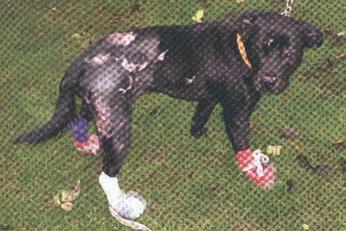
“When 11 month old Border Collie ‘J.J.’ came into our care, she had a pin / plate poking through
a badly infected front leg, a paw so badly crushed the bones had fused together and a stab wound.
“Her original owner pleaded guilty to causing unnecessary suffering to a protected animal and was fined £2,000 and banned from keeping an animal for ten years.

“As you can see from the wonderful photo below, ‘J.J.’ went on to much better things.”
Gifts in wills fund almost one in two veterinary treatments and so legacies are an absolute lifeline to the rescue and spaying/neutering work carried out by Friends of the Animals.

The charity has a policy of non-destruction, unless an animal is sick or injured with no hope of recovery, and they keep admin costs to a minimum. Very importantly, 96% of their staff are volunteers, which ensures as much of your gift as possible is spent on saving animals.
Pitted against that constant battle to save lives was the action of the person who set fire to the front of the Charity’s base.

“But, happily,” said Helen, “we're a resilient team and together with the help of supporters, we barely skipped a beat and just kept on going.
“We truly appreciate that people have many choices regarding charities to support, but no one appreciates it more, or tries harder than we do, to get the very best possible use from every penny donated. Thank you for your consideration.”
5 5


6 6
LEGACY EXCELLENCE CONFERENCE RETURNS ONLINE
THE HIGHLY-REGARDED Excellence in Legacy Administration (#ELA23) will once more take place online this year – on 5 December as a full-day virtual conference.

Organised by Smee & Ford and the Institute of Legacy Management (ILM), the event combines panel sessions, data analysis, case studies and TED-style talks – all informed by sector-leading experts. The day will offer both inspiration and first-hand solutions on legacy administration strategy and best practice, as well as highlight the challenges the sector will face in the coming year.
Key themes for this year’s event include:
• Spotlight on legacy income and probate notification data – hear from key experts from Smee & Ford, ILM and HMCTS to analyse the current landscape for gifts in wills. How quickly are charities receiving their notifications and bequests; how much money is coming their way?
• Cost of living crisis. The major threat looming on the near horizon is the economy: high inflation, energy bills, the effects of equity release and the threat to house prices have the potential of causing a perfect storm of challenges that could seriously affect legacy income for decades to come.
• Contested wills – causal area, economy or COVID? What’s behind the significant spike in contested cases? How can legacy teams deal with this uptick with already stretched resources? Hear from three charities who give their perspective on the situation.
• Forecasting legacy income during uncertain economic times. The legacy sector has made rapid changes and improvements to its working methods, processes and capacity over the past two years –but how many legacy teams are fully up to date with their technology and data function?
• Finding the next generation of your legacy team. Recruitment and staff turnover have never presented a bigger challenge for charity legacy teams. With vacancies taking too long to fill and overstretched teams needing extra support, where can legacy managers find the professionals to fill the gaps?
Other hot topics will include:
• Predatory wills – the hot topic in the sector right now. Find out the red flags to look out for, the progress of the Charity Commission position and recent cases.
• Property bequests in a buyers’ market – practical solutions for difficult cases. When a property is a slow sale – what’s next? The session presents a road map of how to deal with sitting tenants, dilapidation and other tricky scenarios while maintaining reputation and minimising costs.
• Digital assets – looking to the next generation of virtual assets. How can legacy administration value and manage these gifts?

• Managing and motivating a hybrid legacy admin team. Now we are fully into the era of working from home and flexible working, how can legacy managers steer and support a multi-location team and still achieve the best results?
• Working with the bereaved – best practice communication and safeguarding measures. Guidance on how to balance the many roles within legacy administration: diplomat, grief counsellor, house move specialist and family dispute mediator.
This year the one-day ELA conference will be complemented by two optional skills workshops, taking place on 6 December. Those attending can spend 90 minutes examining a topic in depth, led by carefully selected experts who work closely with the sector.
Who should attend?
With sessions for all levels of the team and all sizes of charity – from those new to legacy fundraising, experienced legacy team members looking for inspiration and insight and senior leaders and board members wanting more insight into the income and donor engagement opportunities that can be created from legacy fundraising – the summit is designed to appeal to all charities across the legacy sector.
In particular, the digital format will once again enable charities and speakers from charities outside the UK to view and participate in the summit – and their contribution to the day is welcomed.
Last year ’s conference prompted some notable feedback from those who attended:
“Many excellent practical examples which we can use to increase our effectiveness and show our value to the leadership and managers of our charities.” – The Children's Society
“A very interesting day with really good speakers and very well organised!” – RNLI
“A brilliantly delivered day with varied, relevant and informative content.” – Gurkha Welfare Trust. q
• To register interest visit the website at excellenceinlegacyadmin.co.uk/ register-your-interest-2023-0
RE-HOMING IS THEIR MISSION
[THE MISSION of Three Counties Dog Rescue is to accept, care for and find homes for unwanted, lost and stray dogs and cats and to ensure their wellbeing afterwards. The charity was founded in 1971 and since then they have improved the lives of over 7,600 dogs and cats.

Before rehoming, all animals are vet checked, neutered, vaccinated, microchipped and kept in suitable conditions. Rehabilitation costs are a major part of the charity’s annual expenditure of over £200,000.
Healthy animals are never put down. As part of that non-destruction policy, several elderly dogs are kept in long term foster care. However, this means that the charity can incur large veterinary costs to maintain a dog’s health while they await a new permanent home. They now provide boarding and cremation services with profits supporting the Rescue.
Every penny raised goes to improving the lives of dogs and cats. Three Counties Dog Rescue is run entirely by voluntary and unpaid helpers, who also meet their own expenses. q
7 7
[
FAIRNESS IN THE FAMILY COURT MAY HELP REDUCE CHILD SUICIDE RISK, CHARITY FOUNDER BELIEVES
[ PROMOTING AND ASSISTING in access to justice in the Family Court is the aim of Parenting Together, a charity set up by former youth worker Gerry Hannah.

Gerry points out suicide is the most common cause of death among young people – often prompted by the depression caused by family break-up. He believes that in many cases the break-up of the family is avoidable if parents are able to present their version of events.

Said Gerry: “British Family Courts sit in private and they convict parents merely on the ‘balance of probability’. In some cases a judge is persuaded to make a misinformed decision based on race, gender, heritage, beliefs and social status – often causing serious depression which can have lethal consequences.”
Gerry formed his association with humanitarian experts and professionals to ensure low-income, disadvantaged parents involved with social services or Family Court proceedings receive fair and equal justice.
He added: “We mostly provide specialist legal services, advocacy and reports for disadvantaged parents in Family Court proceedings. Our experts, professionals and associate solicitors often work pro
bono to help us resolve exploitation and unlawful abuse of the family law and child protection systems. We framed our projects on the government’s Every Child Matters report, published in 2003, that recommended engaging families in the care and protection of children.”
He points to cases of parents with learning difficulties asking people on social media for advice when they cannot understand the legalese, acronyms and procedures.
“They are usually misguided, posting views and comments that go against them in court. Their social media ‘friends’ are often predators who exploit single parents with young children. We recently submitted evidence to the CPS against a few of these sexual predators targeting our vulnerable parents and their children.”
The current project is a continuation of Honeypot Families , a work-in-progress study comparing families in the safest happiest regions of the UK with families in what Gerry describes as ‘the most dangerous city in Europe’.
“We concluded that Judeo-Christian families functioned efficiently to provide the best outcomes for everyone because they are based on a mutually agreed contract where adults vow to love, care and respect each other until death.” q
8 8
ANNUAL WEEK IS OPPORTUNITY FOR LAWYERS TO PROMOTE LEGACY GIVING
REMEMBER A CHARITY WEEK is the legacy sector’s big flagwaving event: an opportunity for everyone to take a moment to consider leaving a gift to charity in their will, after looking after family and friends. This year's Remember A Charity Week ran from 11 to 17 September.

Over the summer promoters Remember A Charity were creating bespoke legacy marketing assets for its member charities, allowing them to personalise with their own messaging, imagery and branding.
Alongside the message to the general public about the value of leaving a gift in our wills, the week is an opportunity to get the message across to solicitors and other professional will writers that raising the possibility of leaving a legacy can help to spread the message to people who are already in a position to be considering the option.
The organisers state: “Remember A Charity Week is a great opportunity to promote the importance of having an up-to-date will, as well as opening up conversations around charitable estates, and any relevant tax breaks, to your current and prospective clients.”
Remember A Charity offers its Campaign Supporters a full set of campaign assets to help them promote the week – and their will-writing services. Over 800 professionals across the UK are on board.
Figures show that 74% of the British public support a charity during their lifetime. The issue is that only 6.4% think to include them in their will. Remember A Charity offers the opportunity to help them bridge that disconnect.
It’s free to become a Remember A Charity Campaign Supporter. They receive access to a range of tailored resources, promotional materials and benefits exclusively available to Campaign Supporters.
According to the infographic on their website, benefits include:
• Details listed for free on their directory of solicitors and will-writers. This helps to promote their business by providing an easy way for the public to find an adviser to help them with their will-writing needs.
• Use of their high-profile annual awareness campaign Remember A Charity Week to promote the benefits of an up-todate will. They also receive a toolkit of promotional materials to use throughout the week.
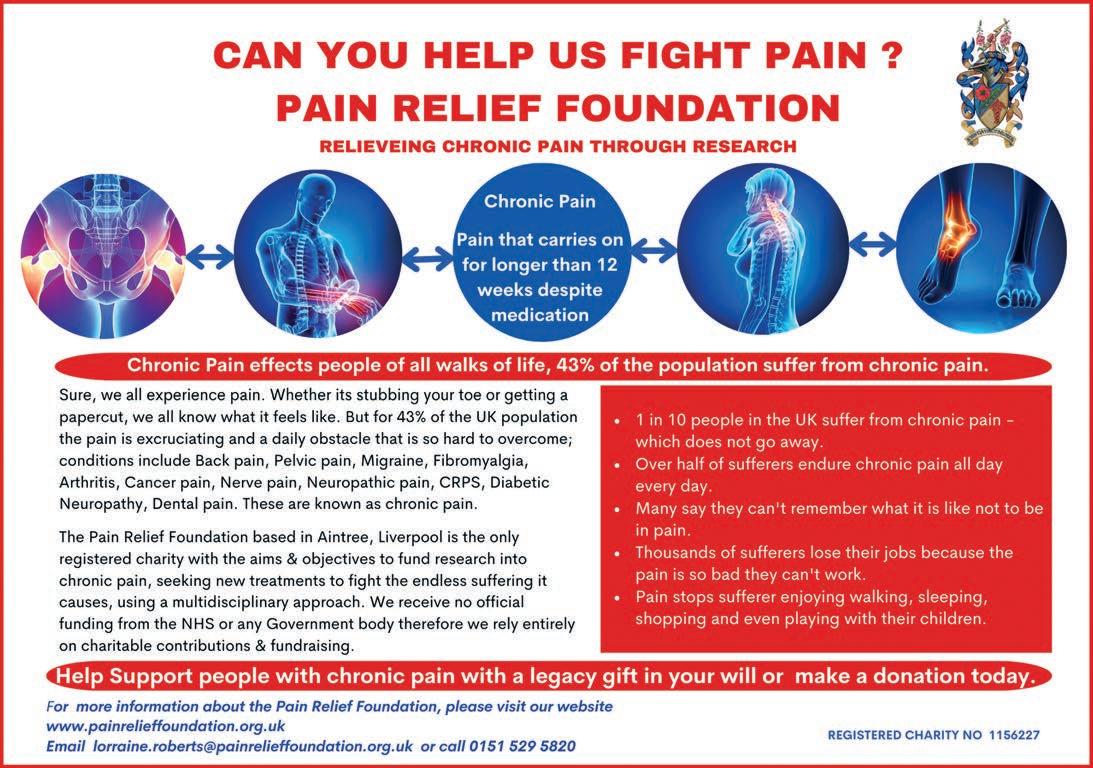
• Resources to help get the conversation started: they provide template materials, guidance and support to help the supporter approach conversations with clients, along with background information about just how crucial that form of giving is to UK charities.
• Logos to show support: they can use the Campaign Supporter logo on marketing materials to show support and enhance their reputation among both current and prospective clients.
• Exclusive For Legal discount: Remember A Charity partners with online training provider For Legal to offer 50% off their premium plans, helping to complete CPD requirements. q
9 9 [

CARING FOR CANCER WITHOUT ANIMAL EXPERIMENTS IS THIS TRUST’S AIM
[ANIMAL-FREE CANCER RESEARCH

is the ethos of the Caring Cancer Trust (CCT), which funds groundbreaking, ethical, animal-free research into cancer, its non-invasive treatment, cure and prevention.
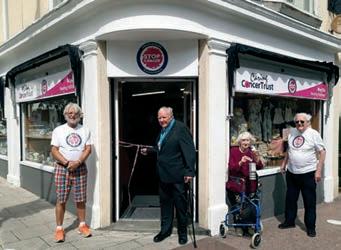
CCT has its own ‘Stopcancer’ laboratory research programme that does not use live animals or embryonic stem cells. Over the past 20 years CCT-funded oncology researchers have discovered potential new causes of children’s cancer, developed new treatments for earlystage cervical cancer and are now advancing knowledge for the prevention of cancer.
Cancer prevention
Humans are now living longer than ever before. Unfortunately, this increased life expectancy has been accompanied by an increase in many age-related disorders. Indeed, the COVID-19 pandemic has highlighted age-related increased susceptibility to viral infections, which occurs in older people.
Age-related damage to cells has by far the greatest influence on human health promoting the development of not only cancer, but cardiovascular, neurodegenerative and autoimmune diseases.
Current opinion is that novel treatments which inhibit cellular ageing have the potential to reduce the development of cancer and all these ailments simultaneously rather than having to treat each separately. Most notably, such treatments will not just be for the benefit of older people. They will also find use in children and younger adults since the use of chemicals and radiation for cancer therapy artificially accelerates the ageing process. Furthermore, it is known that some infections, such as HIV, also accelerate the ageing process.
Cancer support
CCT also provides special ‘Youth2Go’ Healing Holidays of creative adventure for children recovering from cancer, enabling them to regain their self-confidence and re-ignite their passion for life after the trauma of their illness and lengthy treatment. In addition, they provide financial support for adult cancer sufferers to ameliorate their sickness, improve their quality of life, limit their stress and, where possible, help their recovery.

A cancer-free future
CCT-funded research aims to increase understanding of how silent infections, lifestyle, diet, genetic predisposition and environmental pollution lead to different types of cancer in children and adults. Indeed they have identified simple changes in lifestyle and diet which, combined with avoidance of exposure to environmental contaminants, will reduce the incidence of cancer in all age groups.
The CCT aims to identify and understand hitherto-unknown cause-and-effect relationships to either limit exposure to such carcinogenic factors or devise therapies which suppress their effects before a cancer has developed.
Prevention now saves treatment later
The CCT research mission for cancer prevention involves:
• New lifesaving cancer prevention medicines
Funding
Caring Cancer Trust’s Stopcancer programme is entirely managed and run by unpaid volunteers and financed by legacies and donations. A gift to them funds animal-free research into cancer treatment and prevention as well as Youth2Go creative adventure holidays for children recovering from cancer.
In short, they aim to create a cancer-free tomorrow for the children of today. q
For the last 12 months, the CCT has been funding the University of Manchester spinout company Ravan Bio Ltd to develop a novel antiaging treatment to prevent cancer and the other age-related diseases. Ravan’s new therapy is taken orally, has no side effects and is very safe. Furthermore, indications are it is extremely successful resulting in a >80% reduction in the biological age of test subjects and it is anticipated this work has great potential for the prevention of cancer and other age-related ailments.
• New therapies for cancers in their early
• stages
• Analysis of the role of microbes in causing
• cancer
• New therapies for later-life cancers

• Heightened cancer awareness by GPs and
• public
• Lifestyle, diet and environmental changes for
• cancer avoidance
• Dissemination of trial results relating to
• cancer treatment and prevention
11 11
HEARTBEAT HORSES HAPPY IN THEIR NEW HOME
[
THE HEARTBEAT HORSES now live in a new home at Sink Farm in Woodbridge, Suffolk and are cared for alongside the wonderful Suffolk Punch horses.
Sink Farm is the colony stud for the Suffolk Punch Trust charity, who continue their important and essential work in preserving this unique breed. q
• For more information on either charity please contact Tracey Pettitt, stud manager or David Clarke, finance director, on 07768 025128. Heartbeat Homes for Horses, Sink Farm, St David’s Lane, Hollesley, Woodbridge, Suffolk IP12 3JR

TRUST WORKS TO SAVE ICONIC WORKING HORSES

[THE SUFFOLK PUNCH TRUST is a registered charity, whose aim is to ensure the survival of the famous horse breed. It was founded in 2002 to save the historic Hollesley Bay Colony Stud.

That stud brought a rich legacy of equine and agricultural history which deserves to be saved for future generations to enjoy. The trust aims to achieve that through a successful breeding programme, supported by funding, education and the outreach facility of its visitor centre.
The Suffolk Punch is the oldest English breed of working horse, dating from the 16th century. Every Suffolk horse can be traced back to a stallion, known as Crisp’s Horse of Ufford, foaled in 1768. The Suffolk horse was developed for farm work and gained popularity during the early 20th century. As agriculture became mechanised, however, the numbers fell and the breed almost disappeared completely.
The aim of the trust is to help save the iconic breed from extinction through its established breeding programme. It is working towards increasing the numbers of horses through normal breeding processes and an artificial insemination programme.
It also works to raise public awareness and is training a new generation of professionals to work with and understand the needs of the breed. The Suffolk Punch is incredibly versatile and is now often employed in forestry and ridden work.
The Suffolk Punch Trust can only continue its work with the help of donations and legacies. As David Clarke, one of the trust’s directors, explained: “Your legacy, large or small, will make a huge difference to the work we carry out, enabling us to care for our horses and continue the breeding programme to secure this wonderful breed.” q
12 12
LEGACY AWARDS GEAR UP FOR REPEAT PERFORMANCE
[FOLLOWING A HIGHLY successful inaugural event in April, the Smee & Ford Legacy Giving Awards will be returning to London next April to showcase the outstanding achievements, talent and dedication of UK legacy giving professionals and spotlight the vital and significant income that gifts in wills provide.


The Smee & Ford Legacy Giving Awards 2024 will be held on 18 April at the Hilton London Bankside from 12:15 to 4:30pm. It will be an afternoon of excitement and celebration to recognise colleagues, teams and partners for their successes and achievements over the past year in legacy fundraising and administration.
The Legacy Giving Awards offer a rare and unique opportunity for legacy professionals to gather together with colleagues and peers from across the sector. Presented by a wellknown celebrity host, those attending will be part of a sector-wide celebration and an afternoon to remember.
In the morning, the Legacy Giving Excellence Forum is an opportunity to join 200 shortlisted finalists and judges to examine the factors and techniques that are driving excellence, innovation and impact across the legacy sector.
Pre-ceremony networking will commence with welcome drinks and a seated threecourse lunch with wine, followed by the awards ceremony.
The afternoon ceremony offers an opportunity to salute the rising stars – with 19 award categories covering the many aspects of legacy administration and legacy fundraising.
The event will take place at the fivestar Hilton London Bankside, near to London Bridge and Blackfriars Stations.
Shakespeare’s Globe, the Millenium Bridge and the Tate Modern art gallery are all
CARING FOR CHELONIA
[ THE BRITISH CHELONIA GROUP publishes six newsletters a year containing details of meetings, short articles, news items and veterinary notes. Their journal Testudo is published annually and contains original articles and reviews on all aspects of turtles, terrapins and tortoises – their biology, conservation, welfare, veterinary care and husbandry. The group also organises symposia.
As well as the yearly appeals in aid of specific international causes in chelonia research and survival, the BCG assists other worthy causes in support of its aims with grants. They invite grant applications from organisations and individuals engaged on the work of chelonia conservation – such as zoos, universities, zoologists and students in this country and overseas. q
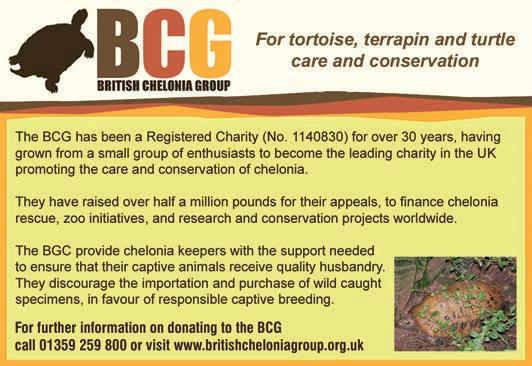
about a five-minute walk from the hotel on London’s South Bank.
The inaugural 2023 Awards proved to be an outstanding event for the legacy sector. The event inspired charities to think bigger and aim higher. Best of all, it was a day where the legacy community gathered to share their pride in working in the incredible sector and truly recognise and reward the hard work, creativity and collaboration that goes unseen in realising the life-changing gifts left in legacies – enabling donors to leave a positive mark on the world.
This year’s awards are free to enter and opened for entries on 4 September. The full list of categories will soon be announced, so whether a charity is large or small there are opportunities for everyone to get involved.
To register your interest and to receive updates on the awards and how to be part of the 2024 Legacy Giving Awards, visit legacygivingawards.co.uk/register-yourinterest-2024.
13 13
q
OUT AN SOS FOR THE OWLS
[ESTABLISHED IN 2001, the Suffolk Owl Sanctuary – known, appropriately, as S.O.S. – operates a comprehensive facility for the rescue, care and rehabilitation of owls across East Anglia. It also promotes the need for the conservation of endangered owl species throughout the UK with its Saving Britain's Owls initiative.

The S.O.S. owl and raptor hospital at Stonham Aspal is unique in the region.
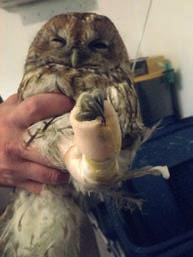
It is specially equipped for the care and treatment of the many injured wild owls and other birds of prey it receives every year as a result of road traffic accidents, mishaps, starvation, trauma, disease, poisoning and sometimes even shooting or trapping.
Many of the birds can be given a recuperative, short-term pick-me-up before being re-released into the wild. Those that are more seriously injured but stand a chance of recovery are given medical aid and/or surgery, as determined by their vet. The birds are then allowed space and time to fully recuperate in one of the secluded recovery aviaries, before being carefully returned to the wild.
S.O.S. operates a wild owl nest box scheme that includes building, locating, curating, and repairing environmentally friendly nest boxes in appropriate locations to replace the gradual erosion of natural nesting sites.
S.O.S. is funded purely by donations and as a small charity, the legacies it receives play an important role in enabling it to sustain the resources needed to actively promote the conservation of owls and other birds of prey throughout the UK. q
LEGACY GIFTS PROVIDE A LIFELINE
Since its founding in 1883, Edinburgh Dog and Cat Home has relied almost entirely on gifts in wills to keep its doors open.

The home costs nearly £3m a year to run, and in the absence of any regular government funding, they are left almost completely dependent on donations and fundraising initiatives to keep going.
One of the most powerful ways that the community has supported the charity is by leaving gifts in their wills. An astounding one in three animals that reside with them each year has had their care funded by legacies.

Legacies and Individual Giving Manager Ella Wilson explained: “We simply couldn’t keep going without this lifeline and there really are no words to describe what it means to us when we discover that someone has made that decision to include us in their will.
“This support can transform the lives of the hundreds of vulnerable animals who need our help each year – for as long as they need it. By leaving a gift, your love and compassion for animals can live on.”
To find out how to make a lasting contribution, please visit edch.org.uk/legacies or contact Gillian MacAulay, Legacies and Individual Giving Manager on 0131 609 0621 or by emailing fundraising@edch.org.uk
14 14
SENDING
CMA IS INVESTIGATING UNREGULATED WILL AND PROBATE SERVICES
[ THE Competition and Markets Authority
(CMA) is conducting an investigation into unregulated will-writing and pre-paid probate services, as well as into online divorce services. It follows concerns that not all organisations are complying with consumer protection law.
The CMA has been running a consultation with interested parties like consumer advocates, professional bodies, trade associations or any consumers with experience of using someone who is not a solicitor to provide a will, online divorce service or pre-paid probate plan.
Announcing its investigation, the CMA said: “When it comes to legal services, customers now have many alternatives to the conventional law firms on the high street, especially for services where the adviser does not need to be a solicitor. Alternative providers very often offer services that are innovative and convenient for consumers, and that can be cheaper, too. But where they are unregulated, it becomes all the more important that normal consumer protection laws are complied with and, if necessary, enforced.”
Initial research by the CMA identified three main areas of concern involving potential risk to customers and possible breaches of consumer protection law.
Will-writing
Anyone can legally write a will and, although many are drafted by regulated lawyers, will-writing itself is not a regulated service. Concerns include:
• Consumers being misled by advertising that offers an extremely low
• initial fee for advice, but does not indicate that final costs can
• increase significantly
• The use of potentially unfair contract terms such as exclusions
• of liability, failure to provide cancellation rights and terms which
• automatically appoint the firm as executor – often for a fee
• Reports of pressure selling and coercion of vulnerable customers
Pre-paid probate plans
A new development in the market. Customers pay set fees upfront for probate, the legal process of managing someone’s estate when they die. They do so in the hope that, following their death, their families will not be required to pay anything else. Concerns include:
• Pressure selling techniques being used on elderly and other
• vulnerable people
• Lack of transparency about what costs are covered
• Plans that are unnecessary or fail to serve their purpose, leading to
• delays in the probate process and bereaved relatives being left

• unable to settle bills or sell property
• Lack of customer awareness that their money may not be
• adequately protected, even if held in trust
Online divorce
The so-called ‘quickie’ divorce services have grown in popularity since the COVID-19 lockdown. Concerns include:
• Misleading claims about both the simplicity of the process and

• prices, which leave customers unclear about what they can be
• helped with or what they are paying for
• Inadequate quality of service, including the firms using the wrong
• forms, entering incorrect details, sending papers to the court late
• and not communicating efficiently with customers
The CMA is also concerned that, if a company ceases to operate, there is a risk that customers’ money or important documents, such as their will, may be lost.
Sarah Cardell, chief executive of the CMA, commented: “These services are essential to people, often at the most challenging times in their lives. The CMA is aware that rising living costs mean people are watching their spending, so shopping around for a more affordable option is attractive and sometimes a necessity.
“These may not be frequent purchases, but they are life-changing. That’s why it’s so important that we investigate so that people can select the right legal service for them – for divorce or probate or willwriting – with confidence. It’s essential that firms get the basics right, including complying with general consumer law which applies to all traders. Customers must get a fair deal.”
Commenting at the launch of the inquiry, Matthew Lagden, CEO of the Institute of Legacy Management, said: “This is news that will undoubtedly be of interest to our members. Together with Lucinda Frostick, director of Remember A Charity, we are currently considering our response and will share this in due course.”
The CMA has written to a number of firms that offer the services in order to seek further information about their practices. Further updates as part of the investigation will be published on the Unregulated Legal Services Case Page of the CMA website at www.gov.uk q
15 15

NEW TERM COINED TO REFLECT NATION’S ‘WILLANTHROPY’
CHARITABLE
LEGACY UMBRELLA BODY Remember A Charity
is calling on dictionaries to recognise a new term to celebrate the generous acts of everyday people that are on the rise. The concept of Willanthropy – the act of giving to charity in a will – seeks to overcome a big misconception: that you need to be wealthy to do something wonderful and make a difference for good causes in your will.

The number of adults aged over 40 who have left a gift to charity in their will has risen by 43% in the past decade – a steady increase in the proportion of people choosing to give from their will over time.
After taking care of family and friends, even leaving a small gift in a will could help to make a huge impact on charities big and small. And it matters now more than ever, with 81% of charities revealing that service needs increased compared to last year and only just over a third (38%) confident they can afford to meet that demand. That is why Remember A Charity has coined the new term to inspire more everyday people to consider leaving a gift to charity in their will.

According to Remember A Charity: “Not only do donations enable people’s passions and values to live on through their favourite charities’ work – but they can also offer generous tax incentives. When you leave a donation to charity in your will, that amount is free of tax: effectively increasing the tax-free allowance. And if you donate 10% or more of your estate, the inheritance tax rate is discounted from 40% to 36%, which can make a considerable difference.”
Willanthropy comes in all shapes and sizes, its promoters say: from small but no less meaningful donations to sizeable gifts. Anyone can be a Willanthropist.
Through its member charities, Remember A Charity has pulled together the stories behind some of the UK’s Willanthropists in a web page Discover the nation’s growing community of Willanthropists at www.rememberacharity.org.uk/willanthropy
Lucinda Frostick, director of Remember A Charity, explained: “Charities play such a huge part in our communities all over the UK. By remembering those close to our hearts with a gift in our will, we can ensure that their work lives on long beyond our lifetimes. We’re thrilled to be celebrating the nation’s Willanthropists and hope to inspire people across the country to consider those causes that have touched their lives – and what a difference a gift in their will could make.
“So, if there is a charity that you’re passionate about in your community, please consider remembering them in your will once you’ve taken care of your loved ones.”
To mark the launch of Willanthropy, Remember A Charity is calling on dictionaries to recognise it as an official term and encouraging the public to celebrate and share their own stories of Willanthropy, using #Willanthropy on social media..q
17 17 [

HEARTBURN ISN’T ALWAYS HARMLESS
EXPERIENCING HEARTBURN or acid reflux at some point in life isn’t uncommon: perhaps after a large meal, a few drinks or spicy food. Women may have experienced it during pregnancy. There are many medications that can be bought over the counter or prescribed by a GP to try and help.
We don’t usually think about the causes and generally ignore it, hoping it will go away. However, it’s important to remember that persistent heartburn – experienced two or three times a week for three weeks or more – could be a sign of something more serious and needs to be discussed and perhaps investigated further by your GP.

HCUK has provided a mobile diagnostic unit to help with testing and awareness and they have a second being built. They are also involved with work on how best to communicate and engage with patients.

Heartburn Cancer UK (HCUK) raises awareness of the dangers of persistent heartburn; but they are also committed to improving earlier diagnosis of oesophageal cancer and Barrett’s oesophagus – a precancerous condition. The earlier cancer is found the better the outcome and prognosis. HCUK has been supporting the progress and accessibility of capsule sponge test technology like the CytospongeTM and EndoSign®: simple, quick, less invasive tests that can give peace of mind or determine that some further investigation is required. HCUK would like to see the test be readily available at doctors surgeries across the country.
These simple tests are revolutionary: patients would usually be sent for a more invasive, time-consuming and expensive endoscopy at a hospital. Having the simple test at a surgery or mobile unit could really make a difference and save endoscopies for those who most need them. The test involves swallowing a ‘pill on a strong thread’. The coating of the pill dissolves, releasing a small sponge which, when retrieved by a nurse seven minutes later, collects a wonderful cell sample which is analysed for any abnormalities.
Receiving a diagnosis and finding support
Diagnosing more cases of Barrett’s oesophagus is really important, as a patient can then be monitored for any further changes, which are much easier to treat if found earlier and really could help save lives. It may sound obvious, but Barrett’s and oesophageal cancer are diseases which affect the oesophagus – the pipe which carries food from the mouth to the stomach.
Receiving a diagnosis of Barrett’s or oesophageal cancer can be a worrying time, so HCUK spends time supporting those living with these conditions and their families. Making positive changes to diet and lifestyle can be important and HCUK’s supporting dietician helps provide useful information through its website. The charity’s retired GP helps with a blog, with useful details about everything from determining what a Barrett’s diagnosis means to how to help a GP understand the issue by providing the right information about symptoms.
HCUK has literature and information to help understand the conditions and also has some support groups, including an online support group that can be accessed from anywhere in the UK. They are working to develop more groups and expand what support they can offer as they recognise how important that can be for patients, their families and loved ones. Being able to find out answers or speak with other people who are going through the same can help improve stress and wellbeing.
They do their homework
In addition to HCUK’s work to support the progress of capsule sponge test technology like the Cytosponge and EndoSign, they are involved in supporting various research projects, and also work with the Association of Upper Gastrointestinal Surgeons and the Royal College of Surgeons to help provide a surgical specialist lead role for oesophageal cancer to help improve patient outcomes.
They contribute to guidelines and drug approval for NICE and the Scottish Medicines Consortium, too. That involvement helps ensure the patient’s voice is represented and considered at every opportunity.
Awareness and education
Over 9,000 people in the UK are diagnosed with oesophageal cancer annually and only 15% of those patients will survive for five years.
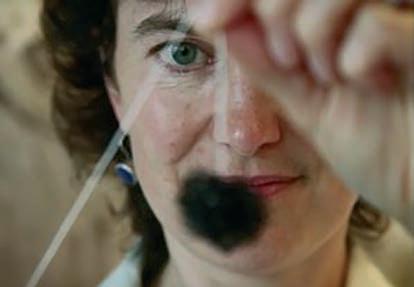
With this cancer being the 7th most common cause of cancer death in the UK and many people having not even heard of it, raising awareness is vital. Symptoms such as a sore throat, hoarse voice, feeling or being sick, trouble swallowing, pain in the chest and weight loss could all be ignored or dismissed without the knowledge that they could be an indication of something more serious.
Awareness will mean that people will be able to recognise symptoms in themselves or others and flag them to a GP sooner. With earlier diagnosis, treatment can be given and the prognosis much improved and, ultimately, lives saved.
Why leave a legacy
A legacy left to Heartburn Cancer UK, no matter how small, means continuance of those key activities with the goal of improving the statistics. With a pledge in a will HCUK can:
• expand awareness of the symptoms
• increase understanding of the need to get medical help sooner rather than later
• help work towards medical investigation being as quick and easy as possible
• improve earlier diagnosis and therefore patient outcomes
• support more people who have received a diagnosis or who have been touched by a diagnosis
• continue to fund and support research into Barrett’s, oesophageal cancer and associated symptoms, treatment and diagnosis and, ultimately, save lives.
• To plan ahead and help another’s future visit www.heartburncanceruk.org or call 01256 338668 for more information.

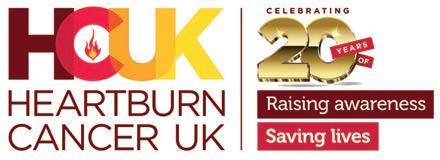
19 19
q
[

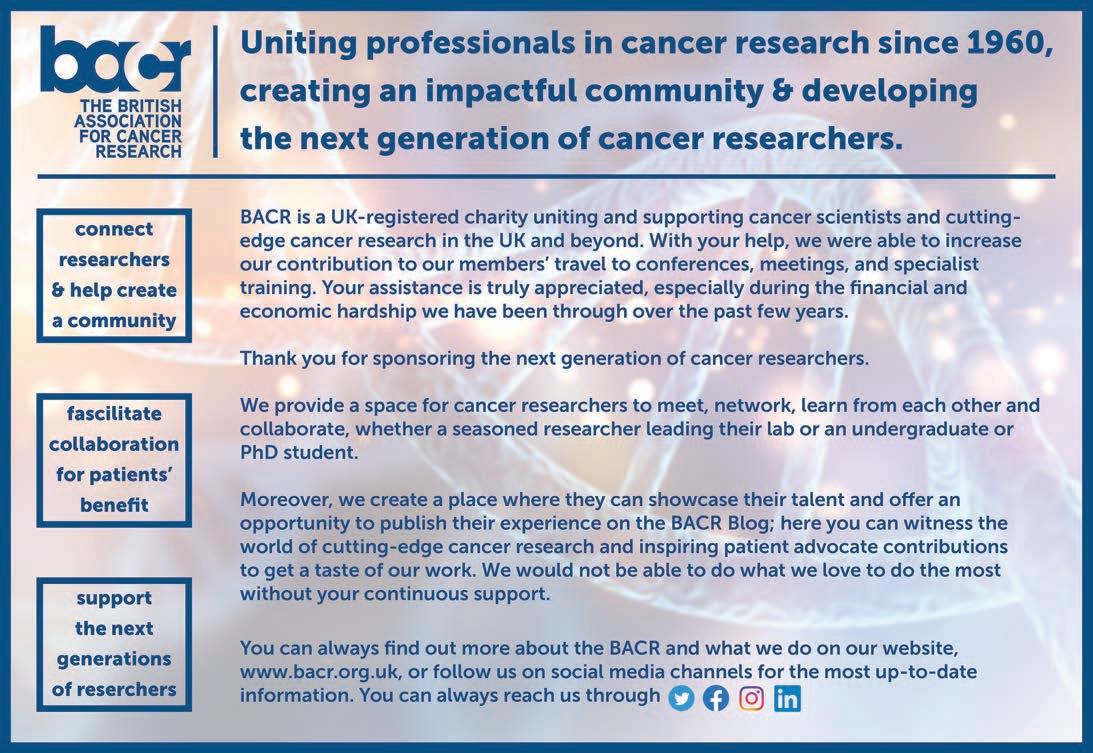
20 20
LEGACY CHARITIES URGE CAUTION ON MOVES TO ABOLISH IHT
[OVER 50 MPs have called for Inheritance Tax (IHT) to be abolished, and the government is reported to be considering including the proposal in the Conservative Manifesto for the upcoming election.

The proposal may have found favour with MPs keen to shore up the ‘Blue Wall’ of constituencies in the South of England, with The Independent claiming that Chancellor Jeremy Hunt may prioritise the move ahead of tax cuts, but charities that rely on gifts in wills have expressed caution.
With the current IHT framework offering generous incentives for legacy giving – a growing and crucial income stream for UK charities – Remember A Charity is calling on government and policymakers to consult with the sector and ensure that legacy income will be protected. Its director Lucinda Frostick commented: “Any change to Inheritance Tax that fails to consider the likely impact on legacy giving and just how vital this income stream is for UK charities would be of great concern to us at Remember A Charity.
“Legacy giving has become a lifeline for thousands of charities and community-based organisations, building resilience and long-term income that has proved crucial in the current economic climate.
“As a representative body for 200 charities that rely on legacy income, we will be urging government and policymakers to consult with us and the wider sector to explore the likely impact on charities of proposed changes, ensuring that legacy income will be protected.”
What are the IHT benefits?
Charitable gifts in wills are currently exempt from Inheritance Tax, charged at 40% above the IHT threshold. What’s more, those that donate 10% or more of their estate to charity benefit from a discounted IHT rate of 36%. That can make a considerable reduction in the amount of tax paid per estate, enabling people to give generously, while also supporting their family and friends.
What’s more, legacy giving has grown substantially – with consumer polling indicating growth of over 40% in the past decade – and while it’s impossible to state with certainty how much of that is driven by the IHT incentives, the tax framework can be a powerful influence on people’s capacity and propensity to give.
HELP FOR THOSE WITH FAILING SIGHT [
FAILING EYESIGHT is nothing short of a personal catastrophe. Do you have a family member, friend or neighbour who is gradually losing their sight?
Reading, recognising friends and living skills are all affected as your sight is going – and it’s much harder if you live alone.
The National Federation of the Blind of the UK (NFBUK) keeps its members in touch with general information, help and updates on what’s going on.


The charity produces bi-monthly news magazines and circulars in audio, braille or electronically, which members can read independently. It also encourages blind and partially sighted people to play a fuller part in society. q
• For further information contact NFBUK on 01924 291313, email admin@nfbuk.org or visit www.nfbuk.org
Crucially, the IHT incentive creates the opportunity and impetus for solicitors, professional will-writers and other legal advisers to raise legacy giving with clients. Research from the Behavioural Insights Team indicates that even the simplest of charitable reference by solicitors during the willwriting process doubles the chances that clients will leave a gift.
Although IHT is a minority tax impacting fewer than 4% of deaths, estates paying IHT account for around one quarter of all charitable estates (9,680) and half of legacy income donated: £1.8bn in 2020/21, according to HMRC. And legacy giving is around six times more prevalent for IHT estates: 36% compared to 6%.
As Remember A Charity points out, gifts in wills now raise almost £3.9bn for good causes annually, funding vital charitable services for charities and community-based organisations across the country. Legacy giving is an integral and thriving part of the UK’s philanthropic landscape.
Remember A Charity is working with the Chartered Institute of Fundraising and fellow sector bodies to build up a body of evidence on the importance of the IHT incentive and to formulate a collaborative response to government.q
21 21
A SCIENTIFIC APPROACH TO ANIMAL WELFARE
[ MOST OF US care deeply about animal welfare and want to do the right thing for animals, be it those we eat, those we experiment upon, or our much-loved pets. But simply caring about animals isn’t enough; to guarantee their welfare we also need to know what makes animals’ lives better or worse.
At the Universities Federation for Animal Welfare (UFAW) their vision is a world where the welfare of every animal affected by humans is maximised through a scientific understanding of their needs and how to meet them. They strive to answer such fundamental scientific questions about animal welfare through funding innovative research as in the examples below.

Welfare impacts of rat control methods
Every year, it is estimated that millions of rats and mice are killed as ‘pests’ in the UK alone. Despite the large number of animals affected, until now very little information has been available on the welfare impacts of common control methods being used in the UK.
A study, co-funded by UFAW, found that glue traps and chemical rodenticides were amongst the worst methods of rodent control in terms of animal welfare impact. The research findings provided vital evidence at an opportune moment as the Glue Traps (Offences) Bill was being debated in parliament. Subsequently the Bill has been passed and glue traps will be banned for public use in England.
Comfortable environments for laboratory mice

Traditionally, laboratory mice have been kept in barren cages and are housed at about 21ºC – but they actually prefer to be much warmer. UFAW-funded research showed that rather than turning up the temperature, the best way to allow mice to keep warm and enliven their environment was to provide materials like shredded paper so they could build a nest. This provided enrichment and allowed them to regulate their temperature just as they would in the wild. The work has improved the lives of millions of mice who are now routinely given nesting material. These and other projects also provide invaluable PhD training for researchers around the world, demonstrating UFAW’s commitment to developing the next generation of animal welfare scientists.
The charity is also passionate about spreading the animal welfare science message. For instance, many breeds of companion animals suffer inherited conditions. UFAW compiled a database of these issues which is invaluable to professionals and pet owners alike in understanding which conditions affect which breeds – visit the website at www.ufaw.org.uk/genetics
UFAW is funded solely by donations and legacies from members and supporters. You can support science in the service of animal welfare by donating to support their work or leaving a gift in your will.
22 22
q
© Brianna Gaskill
PROMOTING ANIMAL WELFARE BEYOND THE FARM GATE

[
GROWING NUMBERS of us are concerned about the welfare of animals that provide us with food. While many people recognise the importance of a good life on the farm, animals may also face welfare challenges ‘beyond the farm gate’.
The Humane Slaughter Association (HSA) plays a vital role in promoting the welfare of animals in markets, during transport and at slaughter, by providing funding and support for essential research.
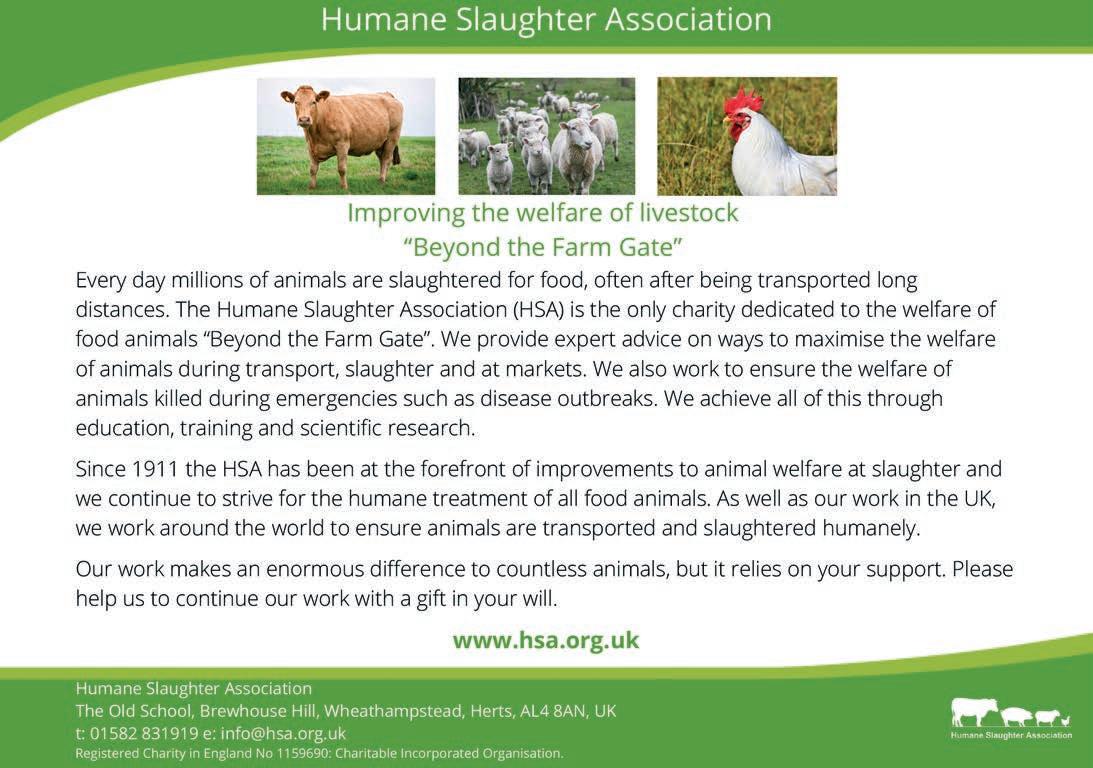
Protecting crab and lobster welfare
At present, crustaceans (crabs and lobsters) are often killed by boiling or carving without first rendering them unconscious or ‘stunning’ them. Some electrical stunning devices are available, but they have not yet been thoroughly validated. For other animals such as octopus and squid (cephalopods), the situation is even more dire with no routine stunning methods available.
The UK recently recognised that these species are sentient – in other words they are capable of both negative and positive experiences. Therefore, it is vital that we protect their welfare and minimise suffering. To achieve this, the HSA has provided funding to support two research projects which aim to identify and scientifically validate humane stunning methods for these species.
The pig issue
In collaboration with Defra (the UK Government agriculture department) the charity recently funded a project to develop a more humane method for stunning pigs in commercial abattoirs. High concentrations of carbon dioxide are commonly used for stunning pigs at slaughter, but there has
been some concern that this can cause pain and distress.
An alternative method – Low Atmospheric Pressure Stunning (LAPS) –was proposed to be more humane, but the research found that LAPS is unlikely to be a humane alternative to carbon dioxide. Whilst disappointing, this provides crucial evidence to protect the welfare of pigs at slaughter and to shift the focus of future research to find other potential improvements.
Practical and international
The HSA is dedicated to bringing practical and lasting improvements to the welfare of food animals around the world. They work with the livestock industry and animal welfare scientists globally to deliver training and advice on the welfare of animals during transport and at slaughter. They are currently working with colleagues in China, the largest consumer of meat in the world, to deliver training and advice to undergraduate students and those currently working with food animals, to improve the welfare of millions more animals.
The HSA is funded solely by donations and legacies from members and supporters. With your help, they can continue to make practical and lasting improvements to the welfare of all food animals. q
23 23
IF YOU WILL, WE WILL
[LEGACIES MEAN SO much to the team at Last Chance Animal Rescue. These wonderful gifts have helped them to rescue, rehabilitate and re-home so many abandoned, abused and unwanted dogs, puppies, cats, kittens, rabbits and guinea pigs who otherwise would have had no future.
The charity understand the wishes of its kind benefactors who have considered them in their Wills. A spokesperson said: “We know they want their generous gift to us to be used directly to save lives, provide the very best of care and to find loving homes.
“Legacies really do provide the gift of life and Last Chance Animal Rescue can now, after much planning and prudent use of funds, offer our life saving services to so many more needy pets. We are delighted to announce we now have a second rescue and rehoming centre in Kent, giving hope and a true last chance to so many.

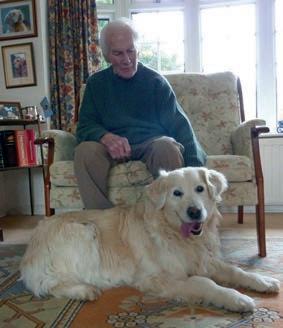

“Sadly we cannot thank those who have enabled this wonderful achievement but are extremely grateful to all those who are currently considering helping us now and in the future to continue our work.” q
GIVING HOMELESS AND UNWANTED DONKEYS A FOREVER HOME
[THE Isle of Wight Donkey Sanctuary is unique – and their donkeys are special. The charity rescues donkeys who need a home, and they look after their health and welfare at the sanctuary. In doing so, they are not only helping the donkeys, but supporting their work with people for whom they bring joy, comfort and happiness.

According to the charity’s Jon Lavers: “Rescuing and caring for our donkeys does cost money. A bale of hay can cost £5, a farrier treatment £30 and an operation can cost several thousand pounds. We are a voluntary organisation and we have to raise all the money that our donkeys need through our own fundraising.”
Thanks to kind and generous support, the charity are currently providing a safe home for over 100 donkeys, some of whom simply would not be with us today if it wasn’t for such donations – like Blakey, who was abandoned in a field with no help, or Phantom who lost his mum when he was just six months old.
Jon continued: “To fund our work, we rely heavily on the kindness people show in leaving a gift in their will. This is something that is difficult to talk about but is vital to our work. Without your generous donations, we simply wouldn’t exist.
“Gifts from legacies have helped us protect the donkeys from rain and sun, fund our donkey therapy programmes for people with specific needs and help our animals work with special school youngsters.
“If you feel that a donation to a worthy charity is the way a loved one should be remembered, we will thank you for your consideration, on behalf of our donkeys.
“A gift in a will is powerful. It transforms the lives of our donkeys and celebrates the life of a loved one.” q
24 24
A new friend for Alan
STATUTORY WILLS: NWR ISSUES GUIDANCE TO THE PUBLIC
IN JUNE the National Will Register (NWR) published guidance to help the general public, who may be faced with dealing with the affairs of someone who has lost capacity, understand the process of obtaining a statutory will.
In its guidance the NWR says: “For those who do not have testamentary capacity, the Court of Protection is able to grant permission for what’s known as a ‘statutory will’ to be made. A statutory will is a will created on behalf of a person who lacks testamentary capacity, approved by the Court of Protection. The court appoints someone, often the Official Solicitor, to represent the individual and draft their will accordingly.
“The purpose of a statutory will is to replicate as much as possible what the person would have wanted had they possessed the capacity to create a will themselves, considering all relevant circumstances. By securing a statutory will, the individual’s wishes can be preserved and their estate distributed accordingly.”

The NWR points out that is essential to
note that the mere existence of an attorney or deputy does not automatically imply a lack of testamentary capacity.
“Before contemplating a statutory will, it is crucial to establish that the person genuinely lacks the necessary capacity. The Court of Protection expects the applicant to thoroughly evaluate all relevant aspects before pursuing a statutory will.”
The guide then points to a number of factors that should be taken into account when the statutory will is drafted.
“Firstly, the applicant must establish the individual’s lack of testamentary capacity. This involves evaluating their ability to understand and make decisions regarding the distribution of their estate.
“Secondly, the proposed statutory will should aim to align with what the individual would likely have wanted if they were capable of creating a will independently. This necessitates a comprehensive
LEGACIES – THE GIFT OF LIFE
ANIMAL CHARITY Wild Futures rescues and offers sanctuary to monkeys who have suffered abuse and neglect. They are dedicated to protecting primates and their habitats worldwide – primates are endangered due to climate change, habitat destruction and the bush-meat and pet trades.

For some species, it is too late. The future of all that remains lies in our hands, so leaving a legacy to Wild Futures is the gift of life and a future for primates and our wonderful planet.
Wild Futures’ holistic approach makes them unique – providing sanctuary to rescued
monkeys, supporting projects overseas, campaigning for primate welfare, educating to protect primates worldwide and promoting a sustainability and ethical ethos.
They receive no government funding, so the generosity of those that remember Wild Futures is essential to enable them to continue their work. A legacy can be the gift of a life worth living and a wild and safe future for all. q

• For more information call 01503 262532, email giving@wildfutures.org or visit the webiste at www.wildfutures.org
assessment of their personal circumstances, including relationships, financial situation, obligations as well as any will they may have already made.”
Even if a will cannot be found in the home or with a particular known solicitor of the person concerned, there may still be a valid will. A Certainty Will Search is able to search the records of over 10 million registered wills, as well as searching unregistered wills with firms in geographically targeted areas, so that deputies, attorneys, the Official Solicitor, family and friends can have certainty on whether a will has been made and lodged with a firm in the UK. q
25 25 [
[

FROM A WORLD WITH MS TO A FUTURE FREE FROM ITS EFFECTS …YOUR WILL COULD TAKE US THERE
[THERE ARE OVER 130,000 people living with multiple sclerosis (MS) in the UK today; and nearly 7,000 newly-diagnosed cases each year.
Life with MS can be tough. It’s unpredictable and different for everyone. It’s often painful, exhausting and can cause problems for people in how they walk, move, see, think and feel. But thanks to support from kind people who donate to the MS Society, research into the disease has made huge leaps forward.
Nick Moberly, CEO of the MS Society, commented: “We still have a long way to go, but today there’s so much more we can do to treat symptoms, manage progression and ease anxiety.
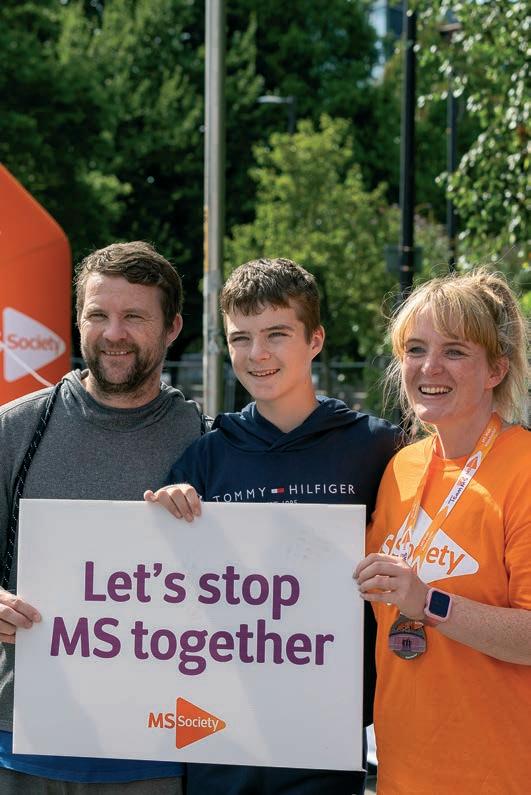
“Right now we’re funding over 40 projects to help improve diagnosis and treatments. And our scientists are making some tremendous breakthroughs. There are groundbreaking discoveries and new knowledge on potential ways to repair myelin and protect nerves; and there are new projects and clinical trials underway. So there’s real momentum and hope on the horizon.
“We’re investing in research to help find treatments that could stop and, maybe one day, reverse the progression of MS. We can’t stop now. Our goal of stopping MS really is within reach. Now, with a gift in your will, you can help make it a reality for the next generation.”

Raphael lives in London with his wife Lucy. They have a four-year-old daughter, Tali, and one-year-old son Asa. Raphael has lived with MS for many years and says the treatment he takes makes a huge difference. It helps him get on with his life with less disruption.
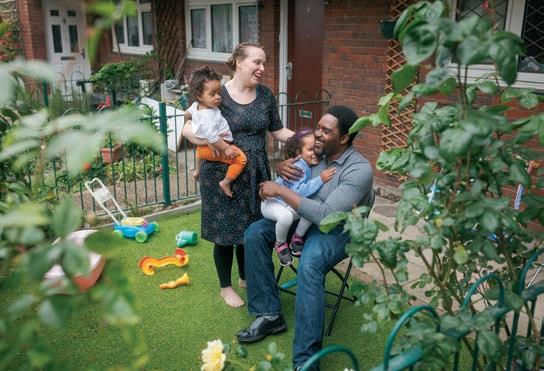
“I want to continue being a supportive father and role model to my kids, and husband to my wife,” he said. “To me, stopping MS would mean certainty over a large part of mine and my family’s future. It would take a huge weight off my mind.”
Nick Moberly continued: “If you’d like to be part of a community of people bringing us closer to stopping MS – whether that’s through providing information and support, continuing to fight for access to new drugs, or supporting vital future research – please think about including a gift to the MS Society when you next make or update your will.
“We understand that protecting the financial future of those you love is your main priority when writing a will. But over 40% of our income comes from those who’ve also included a legacy gift to the MS Society, and no matter the size, it’s thanks to support from people leaving these special gifts, that we’re getting closer to stopping MS and making sure generations to come can live in a future free from its effects.
“With your support, the future is bright for people living with MS. Let’s finish the work we’ve started and stop MS together.” q
• For more information related to gifts in wills and the services the MS Society offers, call 020 8827 0374, email legacies@mssociety.org.uk or visit legacies@mssociety.org.uk/gifts-in-wills
27 27
“
I am so grateful to people who help fuel research into stopping this life-changing illness.
”
Raphael, London (pictured above with his family)
HELPING THE FORGOTTEN PEOPLE OF ZIMBABWE
[ZANE: ZIMBABWE A NATIONAL EMERGENCY is a UK registered charity working to help the most destitute, vulnerable and impoverished people in Zimbabwe. It is the largest supplier of financial aid to elderly people in Zimbabwe who lost their life savings and pensions in the economic collapse and subsequent hyper-inflation.

This includes over 500 frail veterans and their widows who fought for the Crown.
ZANE assists with rent, medical bills and food –and, crucially, also provides comfort, advice and support.


In addition, ZANE funds a clubfoot correction programme, successfully treating over 5,400 children to date. ZANE also funds education programmes including the provision of pop-up classrooms in a high-density township for children who would otherwise not receive an education. It runs creative therapy workshops for women living in extreme poverty who are victims of political violence and trauma.
Zimbabwe remains a country in crisis. With some of the highest inflation and unemployment rates in the world, Zimbabwe’s economy teeters on the brink of collapse. Coupled with a woefully inadequate healthcare system, the need for ZANE is greater than ever for the most destitute people in Zimbabwe. q
• To find out more about the work of ZANE visit www.zane.uk.com

28 28
INVESTMENT GUIDANCE

[ON 1 AUGUST the Charity Commission published renewed guidance on charities and investments, bringing it up to date for the modern era. The guidance – known as CC14 – has been redesigned to offer greater clarity and to give trustees confidence to make investment decisions that are right for their charity.
The language used in the guidance is clearer and the structure has been updated so that it is shorter and easier to use, and trustees can find the information they need more quickly.
As discussion continues within the sector about charities’ ability to account for factors such as the environmental impact of investments, the guidance makes it clearer that trustees have discretion to choose what is best in their circumstances and have a range of investment options open to them –provided they ultimately further the charity’s purposes.
The refreshed guidance follows the commission’s ‘call for information’ and consultation on financial investment and reflects a significant High Court judgment on charity trustees’ investment duties (the Butler-Sloss case). Trustees can have confidence in the decisions they make when following the guidance, knowing it is up to date and properly reflects the relevant law.
The guidance includes examples of various issues which may be relevant for trustees to consider when making investment decisions, such as the potential for an investment to conflict with the purposes of the charity, or the reputational impact of an investment decision.
It lists steps trustees ‘must’ take to be compliant with the law and those things trustees ‘should’ do, which are strongly recommended as best practice but not legally required, as well as explaining that acting in the best interests of a charity is about ensuring that, above all else, any decision furthers its purposes. It also warns trustees to not allow personal motives, opinions or interests to affect the decisions they make.
The new document incorporates previously separate guidance on social investment, and no longer uses terminology that could get in the way of trustees’ understanding, such as ‘ethical investment’, ‘mixed motive investment’ and ‘programme related investment’.
The examples featured in the guidance are designed to help trustees identify the factors that are relevant to their own charity’s situation and then use them to determine how to approach their investment decisions. That should make it easier for trustees to apply the guidance correctly and feel able to justify that the decisions they take are in their charity’s best interests.
Helen Stephenson CBE, chief executive of the Charity Commission, explained: “Our refreshed guidance will help trustees make wellinformed, carefully considered decisions about how to invest on behalf of their charity in a modern context. We would like to thank those who have played a part in helping us shape the updated guidance.
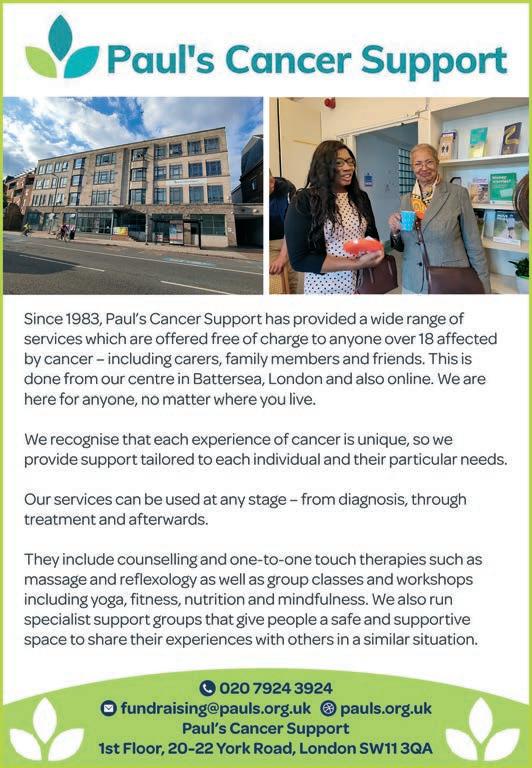
“We are clear that each charity’s situation is unique and there is no ‘one-size-fits-all’ approach to charity investments. We are also clear that trustees have discretion to choose what is best in their circumstances and a range of investment options open to them.”
Addressing trustees directly, she added: “We want to stress that investment approaches are your decision to make; and this guidance is designed to help you do so with confidence and in line with the law.
“You must balance the potential benefits of your approach with any risks it brings to your charity, and ensure that your decision ultimately serves your charity’s purposes. You may opt to take issues such as sustainability or climate impact into account, provided it is in the best interests of your charity.
“Our guidance contains clear advice on how to make sure you are compliant with the law and following best practice.”
The commission conducted user testing during the drafting process, with a sample of 1,000 charities. The regulator also engaged with sector representatives and a range of other relevant stakeholders to help ensure the guidance meets the needs of the charities and trustees who will be using it.
The guidance is available on the Charity Commission’s gov.uk web page. q
29 29 COMMISSION PUBLISHES UPDATED
CONCERN FOR WORKING HORSES’ WELFARE LEADS TO CHARITY’S CAMPAIGNING ROLE
[THE HORSE RESCUE FUND was founded at a time when many deliveries were still being carried out using horses – which at that time were destined for a bleak fate after they finished their working life.
That history explains why, as well as rescuing horses, ponies and donkeys in desperate need, the fund has campaigned for improvements at horse sales, in transit and for equine welfare generally. Indeed, they often work in conjunction with their fellow organisations on some of the largest equine welfare cases.
The charity’s byline is: Rescue, Rehabilitate, Rehome
A spokesperson for the charity commented: “All of our rescued horses are treated as individuals and – being one of the smaller welfare charities – our staff get to know the likes, dislikes and foibles of each horse in our care, so their treatment can be personally tailored to their needs.”
After rehabilitation and when they are fit, their animals are placed on loan in private adoptive homes to lead happy, useful lives. Some have gone on to win at prestigious shows, and even appeared on television!
They continued: “We never sell them, so we are able to ensure their wellbeing for the rest of their lives; and if their loaners’ circumstances change, they can always be returned to us. Horses do so much for humans – we try to repay some of that debt; they cannot speak, but we can.”
Funds are urgently needed to continue that work: legacies, covenants, individual donations or corporate funding are all most welcome. Supporters receive a biannual newsletter keeping them up to date with all the happenings on the yard at Woodstock Farm in Norfolk.
For more information visit the website at www.horserescuefund.org.uk or email info@horserescuefund.org.uk q

PROVIDING A SAFE, LOVING HOME FOR ABANDONED ANIMALS
[FOUNDED AT THE start of the Second World War, Ferne Animal Sanctuary is dedicated to rescuing, rehabilitating and rehoming unwanted and abandoned pets, farm animals, horses and ponies.


Since 1939 the charity has rescued or rehomed 40,000 animals and sadly the demand for their help only ever increases. They currently provide refuge for over 300 resident animals at the sanctuary in Somerset and rehome up to 250 pets each year.
With animal welfare at the heart of everything Ferne does, any animal passing through their gates can be assured of love and compassion throughout the rest of its life. But this work would not be possible without the generosity and support of animal lovers who choose to act rather than look away – people who believe that every animal deserves a second chance and the opportunity to feel happy and loved.
By leaving a gift in your will to help Ferne Animal Sanctuary you will be providing a vital safety net to animals in need. Animals who, through no fault of their own, find themselves in need of a helping hand, some care and attention and a safe, loving home. q
30 30
LOTTERY COMMUNITY FUND LAUNCHES NEW STRATEGY
DURING THE SUMMER the National Lottery Community Fund (NLCF) announced its first major overhaul of the way funding is handed out.
Announcing the changes, the NLCF said: “Social connections and community activities are at the heart of creating healthier, happier lives and a flourishing society. That’s why the National Lottery Community Fund supports amazing community-led projects; and why we’re looking to make a bigger difference in the years ahead, by listening and responding to communities and by focusing on supporting bolder change.
“Thanks to National Lottery players, we plan to distribute at least £4bn of funding by 2030: supporting projects that will create resilient communities that are more inclusive and environmentally sustainable; projects that will strengthen society and improve lives across the UK.”
The new strategy is based on four bases: supporting communities to come together; being environmentally sustainable; helping children and young people to thrive; enabling people to live healthier lives.
The NLCF explained: “We’ll support communities to connect by creating accessible, welcoming places, both physical and virtual, for people to meet; initiating engaging and inclusive activities that support connections within and between groups of people; enabling people from all backgrounds to shape the future of their communities and cultivating an increased sense of belonging.
“We’ll support environmentally sustainable communities that reduce carbon emissions and negative environmental impact, create positive environmental impacts, establish equality of
access to the natural environment and improve the quality of natural spaces.
“We’ll enable children and young people to thrive by creating opportunities for children and young people from all backgrounds to enjoy community experiences; helping children and young people shape the decisions that affect them and their communities and providing children and young people with access to safe spaces to play, participate, socialise and get support.
“We’ll enable people to live healthier lives by helping reduce health inequalities, increasing opportunities for community participation to shape better health services and taking a preventative approach to health.”
NLCF chief executive David Knott commented: “Our new strategy will see us turbo-charging our support for grassroots projects while also focusing our funding firepower on four of the big social issues facing the UK and its communities today.
“Why? Because the money we plough into grassroots reaches the most people and mobilises the most volunteers out of all our funding, and because we’ve listened carefully to different communities and stakeholders to understand where our grants can make the biggest impact.
“In this new chapter, we’re building on what we’ve learned over the last 30 years. We’ll retain the local and relational grant making approach we know is valued so highly. But we want to make a bigger difference. We know that bolder change demands greater focus and deeper partnership. We don’t expect to have all the answers and, by being more than a funder, want to learn and work with others.” q
THE PERFECT STORM
THE PERFECT STORM of the pandemic, a huge rise in dog ownership and the cost-ofliving crisis has hit Hope Rescue hard. Despite the challenges, the charity continues to do all it can to help dogs in need, but resources are stretched to the limit. In this time of crisis, they are reaching out for urgent help to weather the storm.
2022 was a tough year for the charity but, so far, this year has brought little relief and a fresh set of challenges. With around 3.2 million dogs purchased during the pandemic, it’s not surprising that they are experiencing a huge surge in the number of dogs coming through their doors.
As the cost-of-living crisis continues to hit every household, the same rise in costs has had a devastating impact on already stretched resources. As well as massive hikes in energy and fuel costs, they have also seen an increase in the cost of other essentials such as dog food, bedding and cleaning materials. The increase in the number of dogs they are rescuing, and the heart-breaking condition they are arriving in, means vet bills have risen from £94,000 pre-pandemic to a predicted £312,000 this year.
Hope Rescue urgently need your help to weather the storm. It’s not an option to reduce services and put the lives and welfare of the most vulnerable dogs at risk. Too many dogs and their owners are in desperate need. Can they count on you? q
• Find out more about Hope Rescue at www.hoperescue.org.uk or get in touch via enquiries@hoperescue.org.uk


31 31 [
[
UNTIL CLEFTS ARE PREVENTABLE, HELP IS AVAILABLE WORLDWIDE
[TODAY, ONE IN 700 BABIES in the UK are born with a cleft lip and palate, the most common form of birth defect.
The impact on a child’s life as they grow is profound. It may affect not only the way they look, but also their speech, hearing and dental development. And it can leave deep psychological scars.
In the developing world, patients with clefts are frequently not operated on until later in life, if at all. As a result, they may be malnourished and unable to talk well or hear properly. Often, they will be social outcasts.
At CLEFT, our vision is of a future where clefts are preventable. Until we get there, we want to improve the lives of those born with cleft lip and palate – in the UK and in poorer countries around the world.
Join the research effort
By funding research, we continue to make headway into understanding why clefts occur and to deliver pioneering new treatments that deliver kinder, more effective and more efficient care for children with cleft lip and palate.

By supporting the development of cleft centres in low and middleincome countries we aim to give children born with clefts in these poorer countries the same opportunities available to children in the UK. Each donation takes us a step closer to reaching our goal. All gifts could have a direct impact on changing the lives of many hundreds of thousands of babies and children around the world.
Please join us and help us prevent clefts for future generations. q

A SMALL CHARITY WITH A HUGE HEART
[KIDNEY KIDS SCOTLAND, a very small charity with a huge heart, has for the last 23 years supported Scottish children with renal and urology conditions. The main aim of the charity has always been to enable these children to receive treatment as close to home as possible and minimise disruption to the family unit.
In addition the charity helps hospitals all over Scotland, supplying them with much needed equipment and funding posts recognised as being essential. Chronic Kidney disease is a condition that has no cure and that children and their families must learn to live with.

IMAGINE your child only being able to drink 400mls in one day That’s less than two cartons of juice – a can of juice is 500mls.
IMAGINE being a parent where you must be home before 8pm every single night to ensure your child gets their daily home dialysis.
IMAGINE not being able to take your family abroad or too far away from the hospital because your child cannot go without their dialysis. This HAS to happen in hospital 3 or 4 times EVERY week.
IMAGINE your child missing out on school education, social activities, family members’ birthday celebrations, a sibling’s sports day or a family wedding because you need to make sure they receive their life saving dialysis treatment.
IMAGINE your child spending their birthday and/or Christmas Day in hospital and not being able to see their friends from week to week. q
IMAGINE
LIVING WITH KIDNEY DISEASE
For more information about Kidney Kids Scotland please visit our website at www.kidneykids.org.uk, call 01324 555843 or email office@kidneykids.org.uk
Kidney Kids Scotland can help in many ways
32 32
CAF RESEARCH FINDS DECLINE IN FTSE 100 GIVING OVER PAST DECADE
[NEW RESEARCH by the Charities Aid Foundation (CAF) suggests that the UK’s largest listed companies have cut back on their giving to charities. This year’s Corporate giving by the FTSE 100 report shows that companies gave £1.85bn to charities last year, significantly less than the £2.51bn they gave a decade ago. Considering increases in inflation during the period, that represents an even more dramatic cut to crucial charitable funding in real terms.
The report shows that the total amount donated in 2022 is the same as in 2016 – when the analysis was last carried out – while the combined profits of the FTSE 100 have trebled over the same period. The number of companies donating a sum equivalent to at least 1% of their pre-tax profits has also stayed roughly constant: 24 companies gave 1% or more last year, compared to 26 in 2016.
Having endured a pandemic, the cost-of-living crisis and energy crisis, as well as rising inflation, charities providing support to communities may have missed out on vital funding. If the companies in the FTSE 100 had continued to donate the same proportion of pre-tax profits that they did in 2016, the charity sector would have received an additional £3.74bn of funding.
There is clear demand from consumers and employees for action. More than two-thirds (69%) of the public believe businesses have an obligation to support the local communities in which they operate and 70% believe businesses should be more open and transparent about their charitable donations. Yet, since 2013 businesses have not been compelled to report on their community investment and philanthropy in company annual reports.
Neil Heslop OBE, chief executive of the Charities Aid Foundation,
commented: “The role of FTSE 100 businesses in leading a purposeful corporate culture is vital. It is brilliant that a quarter of the UK’s top hundred listed companies are setting an example by committing to the best practice of donating at least 1% to good causes. But more can and should be done, especially now as household incomes are squeezed and charity finances are strained due to the cost-of-living crisis.
“A resilient civil society requires charities, the private sector and government to all play a role. That is why we urgently need the government to draw up a national strategy on philanthropy and charitable giving to mobilise effort by businesses and all of us.”
Findings
The fourth edition of the CAF Corporate Giving by the FTSE 100 report looked at giving in 2022. It is the first report since 2018, which analysed 2016 data. It is based on details of community investment and general philanthropy recorded in annual reports and in ESG (Environmental Social and Governance) reports. For the first time, companies were surveyed by CAF about their giving and asked to expand on details contained in company reports.

The report is based on the framework provided by Business For Societal Impact (B4SI). Most companies in the FTSE 100 are familiar with the framework and many publish data in alignment to it. The report looked at support given globally to charities and community causes by FTSE 100 companies in the form of voluntary cash and inkind donations, matched employee funding, employee volunteering and the management costs incurred from supporting community initiatives. It does not include family foundations, which may receive income from share dividends. q
SAVING LIVES ONE SNIFF AT A TIME
[HYPO HOUNDS provide a viable health care alternative for children and their families by training a Diabetic Alert Dog to detect the subtle changes in the child’s blood sugar levels.

The dogs are trained to alert parents when the child’s sugar levels drop dangerously low or rise too high. This not only impacts on the child but also on the family’s ability to function as a unit, with the registered carer becoming the dog.
Hypo Hounds work is becoming nationally recognised and is literally saving the lives of children – one sniff at a time. q

33 33

CARERS NEED SOME TLC, TOO

JOANNA LUMLEY, Patron of The Respite Association (TRA), recently paid this tribute to carers: “Carers are my heroes: caring 24/7, week-in and week-out, often for years on end, with no breaks or holidays and no complaints.”

Across the country there are thousands of unpaid carers; and since its formation in 2001 TRA has been supporting them to get a desperately needed break.
John Turner, one of the charity’s two part-time staff, explained: “It doesn’t take a great deal to have an enormous impact on the lives of carers. They don’t see what they are doing as a burden because they are caring for someone that they love; but they just need a little rest.”
“One lady, whose son is on the autistic spectrum, explained that he only sleeps for two hours per night, so that is all the sleep she gets, too. That lady just wanted a normal night’s sleep to catch up – while a gentleman in his seventies, caring for his wife who has dementia, wanted a weekend so he could go to his granddaughter’s first piano recital.”
TRA also have two holiday facilities – in Cornwall and Wales – where they give carers a week-long break by the seaside. A carer who had a break in the charity’s caravan at Rhyl wrote: “We had the most
amazing time on holiday – gutted to be home in fact. Whilst I was there I couldn't help thinking of you and what an amazing opportunity you gave us. Me and my family are extremely grateful and always will be.
“The caravan was filled with lots of board games and books for both adults and children and we loved it. I usually don’t have time to read with my children or sit and do a jigsaw with them, but on holiday I did – everyday. And instead of dishing out medication of an evening I spent that time in the park with my family.
“It was so good to just be out in the fresh air and actually taking in the sky! You allowed me to have uninterrupted quality time with my children and for that I’m truly thankful.”
John explained “TRA offers something that you and I take for granted: a little bit of normality; enough to recharge the batteries and carry on caring. We have been incredibly fortunate that people have been very generous to us over the years, which has helped us to support thousands of carers and their families, and has provided a legacy of hope.” q
35 35
[
BROTHERLY LOVE...
[INTRODUCING chimpanzee brothers Fergus and Twmi – they are the reason Wales Ape & Monkey Sanctuary began back in 1998.





Even though they are brothers, their personalities are quite different!
Fergus (36) is very mischievous and loves the camera – and apart from hoarding bananas and eating onions, winding the other chimps up, he loves to be in every single photo you try to take.
Twmi (38) is more cool, calm and collected. He likes to oversee and watch what the other chimps are getting up to but also makes his presence known if needed. He loves head bopping to Queen – his favourite band –
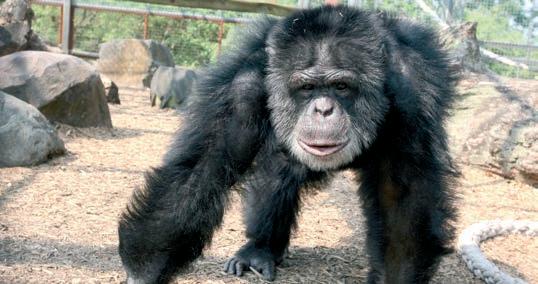
and loves his food. Iceberg lettuce and grapes are a firm favourite.
Fergus and Twmi have a great relationship with Nakima, Bili and Ronnie, the other chimps they live with. You will see them on sunny days relaxing in their hammocks and grooming each other.
The brothers are both very popular amongst visitors. Children often get smiles from Fergus which makes their day! q
• For more info call 01639 730276, email info@ape-monkey-rescue.org.uk or visit the website at www.ape-monkey-rescue.org.uk

36 36
Twmi Fergus
REGULATOR ECHOES CYBER ALERT

[THE Office of the Scottish Charity Regulator (OSCR) has reported on an alert by the National Cyber Security Centre (NCSC) that it has seen a rise in phishing attempts in the UK charity sector.
In its report the OSCR says: “It’s really important to be aware of different types of scams and cyber attacks, including phishing, so you can improve your cyber security, identify potential threats and keep your charity safe.
“Phishing is a form of cyber attack during which scammers send emails or messages pretending to be a trusted person in order to encourage you to reveal personal information,
such as passwords or banking details. The emails may appear genuine, but will contain malicious links, harmful attachments or requests for sensitive information. These deceptive tactics aim to trick employees and volunteers into sharing sensitive information or granting unauthorised access to systems.”
The NCSC have produced a range of helpful resources to help charities understand how to avoid phishing attacks, and how to improve their cyber security more generally. They can be viewed on the NCSC website at www.ncsc.gov. uk/guidance/phishing.
The OSCR stresses that people should remember never to click on suspicious links or download unknown attachments. If they receive a malicious email, they can report it via the Action Fraud portal or by emailing the NCSC incident report service at report@phishing.gov.uk q
WHAT DOES THE FUTURE HOLD? FIND OUT WITH CHARITY DIGITAL
THE FUTURE OF FUNDRAISING is a fascinating landscape, with plenty of room for experimentation. That is how Charity Digital – a charity itself established to help other charities accelerate their missions using digital technology – views the role of technology in charities’ work.
This year has seen charities proving their resilience against the cost-of-living crisis. Many charities have been faced with fewer funds to deal with increased demand. But, as ever, charities have proved their resilience with a host of novel fundraising solutions and creative forms of service delivery.
In 2024, the organisation’s experts predict, charities will go even further. They may flex their muscles with flexible giving, invert
expectations with inverse giving, prove anti-social on social media, embrace the art of artificial intelligence, start playing around with Gaming for Good, and so much more.
In the latest episode of its fundraising podcasts, Digital fundraising trends for 2024, three Charity Digital experts – Laura Stanley, Lisa Chomette and Ioan Marc Jones – discuss, among other things, all the fundraising trends outlined above, together with some of the core challenges and obstacles charities face, and look at digital tools that can help with fundraising.
To register to access all Charity Digital podcasts visit the website at charitydigital.org.uk/podcasts/podcasts q
THIS SANCTUARY HELPS DONKEYS FROM BRITAIN, EUROPE AND BEYOND
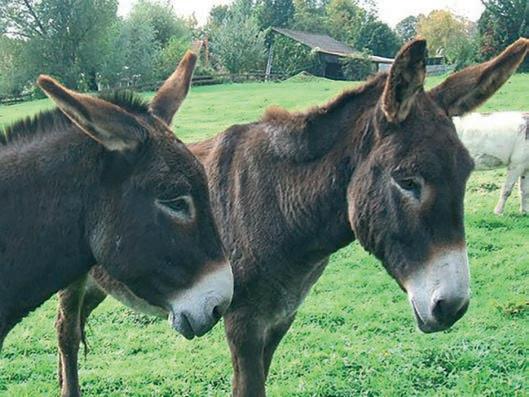
ESTABLISHED IN 1990, NEDDI has offered care and safety to donkeys – and to a lesser degree, ponies – in Britain and Europe who have suffered neglect, cruelty or maltreatment or who are at risk of such treatment.

In addition to rescuing such animals from undesirable situations, within the financial and practical constraints prevailing at the time, they have worked to try to change attitudes and to educate donkey owners into better practices.
Since 2016 they have been assisting associates in Kenya to achieve those aims for the working animals there and NEDDI will now be concentrating on this work, including supporting the operation of road-side clinics.
Since its establishment in Cornwall, NEDDI has operated a sanctuary specifically for distressed donkeys. In 2001 the sanctuary moved to just the other side of the channel, where the resident donkeys enjoyed more space and pasture than would otherwise have been possible. In 2023 the donkeys in NEDDI’s care moved to a long established sanctuary near Clermont Ferrand, in central France, for their continued hands-on care.
NEDDI is a comparatively small organisation with limited resources, and relies heavily on support from animal lovers. A bequest will enable more donkeys to be freed from pain and misery. q
37 37
[
[
YOUR LEGACY – THEIR LIFELINE
ALFIE’S OWNER, Pam, had been diagnosed with a degenerative disorder which affected her ability to care for him. She was also trying to leave an abusive relationship but would not do so until she had secured a safe place for Alfie.

Oak Tree Animals’ Charity managed to safely remove Alfie and brought him to their sanctuary in Carlisle. This enabled Pam to move to a more suitable and safe home, and the charity arranged for Pam to see Alfie again before he went to his new home.
Alfie and Pam are just two of the thousands of animals and owners helped by Oak Tree Animals’ Charity each year. In 2022, Oak Tree hit a new record of 4,300 animals helped and, unfortunately, this number keeps rising every year.
Their ‘A Helping Paw’ service offers pet fostering to victims of domestic abuse and the homeless. The service is run by dedicated volunteer fosterers, and since 2019 they have helped over 60 pets and 40 families. Without generous gifts in wills, the vital work to help animals and owners, like Alfie and Pam, in these devastating situations just wouldn't be possible.
Oak Tree Animals’ Charity and its wonderful supporters have been helping animals since 1909. One supporter who chose to leave a legacy to Oak Tree explained her decision: “I wish more people would support animal charities like Oak Tree and be part of their incredible work. I want to help Oak Tree Animals’ Charity continue its wonderful work for many years to come. It is comforting knowing that I will still be able to support animals long after I am gone.”
More than half of the work at Oak Tree is funded by legacies – including veterinary treatment, food, bedding, heating, enrichment, water and general maintenance, plus so much more. Every donation received means they can open their doors for another day, providing a lifeline to animals across their region. q
• If you would like to find out more about leaving a legacy, please email legacy@ oaktreeanimals.org.uk or visit www.oaktreeanimals.org.uk/get-involved/ways-todonate/your-legacy.html

38 38
[
WEBINAR LOOKS AT THE YEAR’S FUNDRAISING TRENDS

RESCUE CENTRE OFFERS A LIFELINE TO INJURED WILDLIFE
FUNDRAISING DOESN’T EXIST in a vacuum. Fundraisers have to be plugged into the latest fluctuations in the economy, react to changes in the zeitgeist, and be mindful of ever-evolving forecasts for the future.
That, at least, is how Josie Sparling of Charity Digital, who has brought together a suite of Fundraising Facts to help charities understand how the fundraising map has panned out over the past year, sees things.
In the introduction to her webinar Fundraising Facts 2023 she writes: “In recent years the charity sector has been changing rapidly, with half of charities (48%) believing that the pandemic has changed fundraising forever and 86% of charities worrying about the impact that rising living costs are having on the people who use their services.
“To help fundraisers tackle the challenges of the sector today, we have constructed an overview of fundraising facts in 2023, looking at how our changing economy is affecting donors and charities alike, as well as exploring trends in digital fundraising, grant funding, fundraising events, and more.”
She points to how the cost-of-living crisis is affecting charity service users and supporters alike and is presenting new challenges to charity fundraisers.
Charlotte Weatherley, the policy manager at the Chartered Institute of Fundraising, commented: “Charities are facing a double whammy at the moment. Inflation means that demand for services is rising, and on top of that, those services are getting more expensive to run. So the need for donations, whether it’s a one-off or a regular one, really has never been more important.”
Women and men were as likely as each other to state they would make cuts to their charity donations (16% and 17%), despite a higher proportion of women stating they were likely to have to make cuts to their overall spending (72% compared to 66%), she points out. As may be expected, she points to the digital platforms charities use as leading the way.
She writes: “Digital fundraising has been drastically rising since the beginning of the COVID-19 pandemic, when restrictions to all in-person interaction also meant a fall in cash and in-person charity giving.
“According to CAF, 51% of charity supporters used cash to donate before the pandemic (2019), which fell dramatically to 29% in 2021. In 2022, this rose to 35%, which is still far from pre-pandemic levels. Giving to charity through a website or app has increased from 20% before the COVID-19 pandemic to 26% in 2022, according to CAF.”
Her webinar is one of an on-going series of pieces posted by Charity Digital. Others include Three ways charities can use AI in fundraising and The best online auction platforms q
HESSILHEAD WILDLIFE RESCUE TRUST is situated near Beith, in North Ayrshire. It was set up as a charity in 1986, although its founders Andy and Gay had been caring for injured and orphaned wildlife since 1970, when they rescued a fox cub from a gamekeeper and his dogs. As the number of casualties increased year on year, Andy and Gay needed financial and practical help.

Once the trust was set up, new aviaries and enclosures were built. A membership scheme proved popular and many volunteers were recruited. The centre now occupies a 20-acre site, including woodland, marsh and open water. That gives a variety of release sites for its patients.

Approximately 3,500 wildlife casualties are now treated each year, with the aim of returning them to the wild. Among the many hedgehogs, foxes and familiar garden birds there are deer, otters, badgers and seals. All have been rescued and are rehabilitated. In addition, swans are treated regularly, along with buzzards, peregrines, herons and sea birds.
The centre operates a 24-hour rescue service and there are more than 60 enclosures and aviaries, a hedgehog hospital, a seal/swan unit and intensive care facility. It also offers training courses on the handling, care and treatment of wildlife casualties.
Spring and summer are especially busy, with hundreds of nestling birds being hand reared. Care is taken to rear all youngsters with minimum human contact. That prevents wild birds and mammals becoming too used to people, so giving them a good chance of survival in the wild.
Hessilhead is primarily a voluntary organisation. Its volunteers help in many ways: fundraising, building and maintenance, driving patients to the centre and daily cleaning and feeding. q
39 39
[
[
THEY RESCUE ANIMALS –AT HOME AND ABROAD
[MAYBE YOU LOVE ANIMALS: maybe you have given a loving home to dogs or cats in need. Perhaps the suffering of animals through neglect, abuse or abandonment causes you pain. If you would like to help create a world that is kinder to all creatures, remembering Paws2Rescue in your will means you will help to alleviate the suffering of animals for years to come.
The mission Of Paws2Rescue is simple: to help animals in need wherever they are. As they are entirely staffed by volunteers, every penny they raise enables them to fulfil that mission over and over again.

Paws2Rescue’s Alison Standbridge explained: “Although we are a UK- based charity, we recognise that too many animals overseas suffer appalling neglect and cruelty. That’s why, as well as finding loving UK homes for unwanted dogs and cats, we undertake a variety of international projects to reduce the suffering of animals, with a particular focus on Romania and Moldova –countries where animals continue to suffer the most distressing abuses.
“We aim to alleviate the day-to-day misery of these unfortunate animals by meeting their basic needs – food, medical treatment and sanctuary
and by supporting shelters in rural areas where resources are desperately needed.”
But the key to truly ending the misery is to tackle its root causes. Therefore, Paws2Rescue also provide free neutering services for both stray and owned animals, encouraging owners to take responsibility for their pets’ health by preventing unwanted litters of kittens and puppies. Their Veterinary Scholarship Programme funds young people through their university studies to encourage more local vets to work in rural areas in Romania where the need is greatest.
Bobi before and after being rescued

programme uses purpose-made educational materials to foster compassion, teaching children to love and respect all living things.
“So, although our current aim may be to help animals in need wherever they are, our dream is to create a world where no more animals need our help.
Alison continued: “Education is crucial to our mission: if future generations are brought up to hold the same antiquated, cruel attitudes towards animals as many of their elders, then the horrible abuses will continue. To break this negative cycle, our successful schools
“By leaving a legacy to Paws2Rescue, no matter how small, you can rest assured every penny of your kind donation will be helping dogs, cats and other animals in desperate circumstances both now and in the future. Thank you.” q
40 40
–
CHARITIES IN SCOTLAND ASKED FOR FEEDBACK ON NEW FORM
THE SCOTTISH CHARITY REGULATOR (OSCR) is asking charities for feedback on its intended improvements to their Annual Return. All charities in Scotland must complete an OSCR Annual Return and file it with the charity’s annual report and accounts using OSCR’s online system.
The Annual Return allows OSCR to gather information about what is happening within a charity. It then uses the information to help with its regulatory work.
In line with the priorities set out in its new Corporate Strategy, OSCR intends to make improvements to the Annual Return and to the support it provides to charities throughout the submission process. As part of that process it is looking to gather feedback from charities and trustees, and those who support charities to complete their Annual Return, before the proposed upgrades are introduced.
The proposed improvements to the Annual Return process will mean:
• There will be helpful pop-up information to support correct completion of the Annual Return.
• OSCR will provide feedback to charities in response to their submission where the answers to the Annual Return questions indicate a potential issue that the charity trustees need to consider.
• Additional information about each charity will be published on
SCOTTISH CHARITIES BILL IS NOW AN ACT
THE SCOTTISH PARLIAMENT has voted unanimously to pass the Charities (Regulation and Administration) Bill. The Bill was passed on 28 June and became an Act on 9 August, following Royal Assent.
The Act will improve the accountability and transparency of charities and increase the powers of the independent Scottish Charity Regulator (OSCR). The Act:
• Gives OSCR wider powers to investigate charities and

• charity trustees
• Amends the rules on who can be a charity trustee or a senior
• office holder in a charity
• Increases the information that OSCR holds about charity
• trustees
• Updates the information which needs to be included on the
• Scottish Charity Register
• Creates a record of charities that have merged Social Justice Secretary Shirley-Anne Somerville said: “The charity sector plays a vital role in society and support for charities is high amongst the public who volunteer and donate to thousands of charities across the country. This legislation makes practical improvements and updates to existing charity regulation, increasing transparency and helping ensure public trust is maintained.
“Scottish charities have a combined income of £14bn each year so it is crucial that the way they are regulated remains fit for purpose. These reforms will support the effective regulation of charities, helping them to have the best possible environment to thrive.
“I am delighted that the Parliament has unanimously backed this legislation from the start.”
the Scottish Charity Register. That information will comprise a description provided by the charity of the activities it undertakes, the number of charity trustees, the number of volunteers and the number of staff.
Launching its request for feedback, the OSCR said: “To help us provide feedback to charities we need to ask all charities questions about the governance of the charity. This means there will be more questions for some charities to answer. The Annual Return should not be difficult to complete for anyone who understands how the charity operates.
“Asking more questions will allow us to provide charity trustees with guidance which will be useful to them to ensure they meet their legal duties and the charity is well run. It also allows OSCR to identify where education and guidance is required and to identify situations where we may need to take regulatory action.
“Some of the questions we ask may change from year to year. This will allow us to respond to improvements that charities make and the changing environment that charities operate in.”
More information about the changes the OSCR is going to make is published in the Annual Return Feedback document. That includes a copy of the new Annual Return questions.
Thoughts and feedback should be provided by 6 October. Contribution will help to refine the changes the OSCR wants to make to ensure that the end result is positive for both charities and OSCR. q
41 41
[
q
[

Their project is to reintroduce foxes to the wild

[IT WOULD BE TEMPTING to try to explain all that is The Fox Project, but that would look a little like a shopping list: wildlife information bureau, humane fox deterrence consultancy, wildlife ambulance service, wildlife hospital etc.
Instead, it would be more straightforward to concerntrate on what’s going on right now, as we enter the annual UK red fox breeding season, with an expectation of anything up to 300 sick, injured and orphaned fox cubs being receieved by the Fox Project. How does that work?
Wynn was one of the first cubs the project received in 2021. He is pictured gazing thoughtfully out of his pen at the setting sun, perhaps quietly wondering how he can get out into the big, wide world and do what he wants, rather than what we want.
Founder of The Fox Project Trevor Williams takes up the story: “Wynn was picked up next to a dead sibling by a passing dog walker and we assumed they had crawled out of the den in search of a mother that, for whatever reason, had failed to return. He was a keen bottle feeder, and because baby animals need the company and warmth of others, he was grouped with Wendell, Wilfred, Calvin and Bertie.
“Cubs grow fast and a brooder will only hold them for so long before their accommodation needs to be upgraded to steel vet cages. And they, too, are soon inadequate for curious, active youngsters who are developing speed and agility – albeit wobbly speed and agility!
“The next step was day release in a two-storey chicken run and back in the warm at night for a bedtime bottle and a bowl of dog food. They loved that! And then they were moved to a larger foster pen, where muscles could develop and they could feel the weather.
“As soon as Wynn and Co were weaned off the bottle, the bond with their feeder was broken and they were transferred to one of our team of fosterers. These volunteers have pens in their gardens where they can look after the needs of a litter of cubs without getting directly involved with them.
“And that is where the serious work begins in encouraging cubs to revert to wild in preparation for late summer release. Given all the changes, our cubs should be growing suspicious of people in general; and their first instinct when a fosterer approaches is to run into the hutch provided. If they begin to get ‘waggy’ with the fosterer, we move them to another. And we keep doing that right through the summer.
“From mid-June, we start to move them onto pre-arranged rehab sites – no more than five cubs per site. Those are predominantly rural: often farms and smallholdings.”
The cubs are now the responsibility of the rehabber that owns the property. Their job is to feed, water and clean out the pen and never to speak. A cautious cub is a cub that will live the longest: if you’ve made a cub tame, you’ve undermined their potential for a safe and long life.
After four to six weeks on site the cubs are used to the sights, sounds and smells of every other animal in the area and vice versa. That means they can safely be released without danger of attack. Come the night of release, the rehabber simply leaves the door open and walks away.
Trevor continued: “Timing for this final part of the procedure is governed by nature. Just as the breeding season fluctuates a little every year, so does natural dispersal, when wild-raised cubs – by now around five months old – will fan out from their home territory to locate their own: a vital process to avoid in-breeding and necessary if they’re ultimately to find a mate. Release of our cubs is timed to coincide with that point.”
Wynn and his chums were released from a smallholding in East Sussex. Initially, they all returned for support feeding, but it’s seldom needed for long. As they begin to use the instincts nature provided them with, the cubs return less and less frequently.
“When they no longer return,” said Trevor, “we must hope they’re doing well. And we generally know they are, because we often see them around for months, or even years. Not that it’s any of our business. We’ve given them that all-important second chance and whatever befalls them, good or bad, is down to them.” q
43 43
GIVING HORSES AND PONIES THE LIFE THEY DESERVE
FFOREST UCHAF HORSE & PONY CENTRE – aka The Pit Pony Sanctuary


are a small group of volunteers in Wales who help all the needy horses and ponies they can with meagre resources.
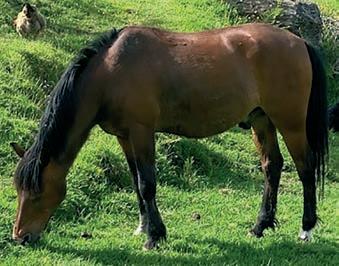
“We have been a charity since 1991, but our team has been doing this work since the 1960’s,” explained the charity’s founder Roy Peckham.
“We found pit ponies still at work in the small private mines in Wales and became their salvation by creating The Pit Pony Sanctuary.
“Over the years we have taken in numerous needy horses and ponies, including some old pit ponies. Our only surviving pit pony ‘Spike’ toiled in several small mines in the Swansea Valley. Although elderly, and needing tender loving care, he is in good health now and enjoying his life at the centre.

“Help us make success stories like Spike’s. Our donors change lives, and you can, too!” q
• For further information visit www.pitponies.co.uk
44 44
[
–
GUIDE OFFERS TIPS TO MAKE THE MOST OF THE END-OF-YEAR FLURRY
[SUMMER MAY ONLY just be over and autumn is setting in, but most fundraisers are already looking towards the end of the year and the flurry of activity that brings –from Giving Tuesday in November to the culmination of the charitable year around Christmas (there, we’ve said it!).
To make the journey easier, Blackbaud, the international cloud computing provider for the not-for-profit sector, has devised Your Ultimate End-of-Year Fundraising Toolkit The toolkit is packed with strategies, templates, checklists and expert advice to help fundraisers tackle their end-of-year planning.
According to Blackbaud: “The last six weeks of the year can be make-or-break for fundraisers. Our toolkit is filled with free stepby-step resources that give you a jump-start on campaign planning.”
The free toolkit includes the following planning tools:
• Checklists for campaign planning
• Social media post ideas
• Email templates
• Worksheets for building a high-impact
• social media campaign
• Data management best practices
• Budget, systems and stewardship tips
In their introduction the authors state: “Harnessing the power of end-of-year giving takes a village – from your staff and board of directors to your loyal donors and new prospects. This busy season is buzzing with generosity and gratitude for fundraising teams like yours.
“But with so much to do, the finer details of planning an effective year-end campaign can fall through the cracks. Take a moment to ask yourself: Are your organisation’s yearend efforts missing something? Do you have the tools you need to take your end-of-year fundraising to the next level?
“Whether your sights are set on a major Giving Tuesday campaign or long-range major donor cultivation, this revised 2023 toolkit has the step-by-step resources you need to energise and engage your supporters.”

The advice comes thick and fast, beginning with 5 Tips to Get the Most Out of Endof-Year: fundamentals to keep in mind throughout the campaign. There follows
PRACTICAL SUPPORT HELPS TO ALLEVIATE THE IMPACT OF SIGHT LOSS
[THERE ARE TWO MILLION people in the UK living with sight loss and by 2050 the figure is set to double. Being diagnosed with any form of sight loss is lifechanging and devastating for both the individuals concerned and their families.
The Partially Sighted Society is a national charity that understands this; it has been providing help and support to anybody living with sight loss for over 50 years.
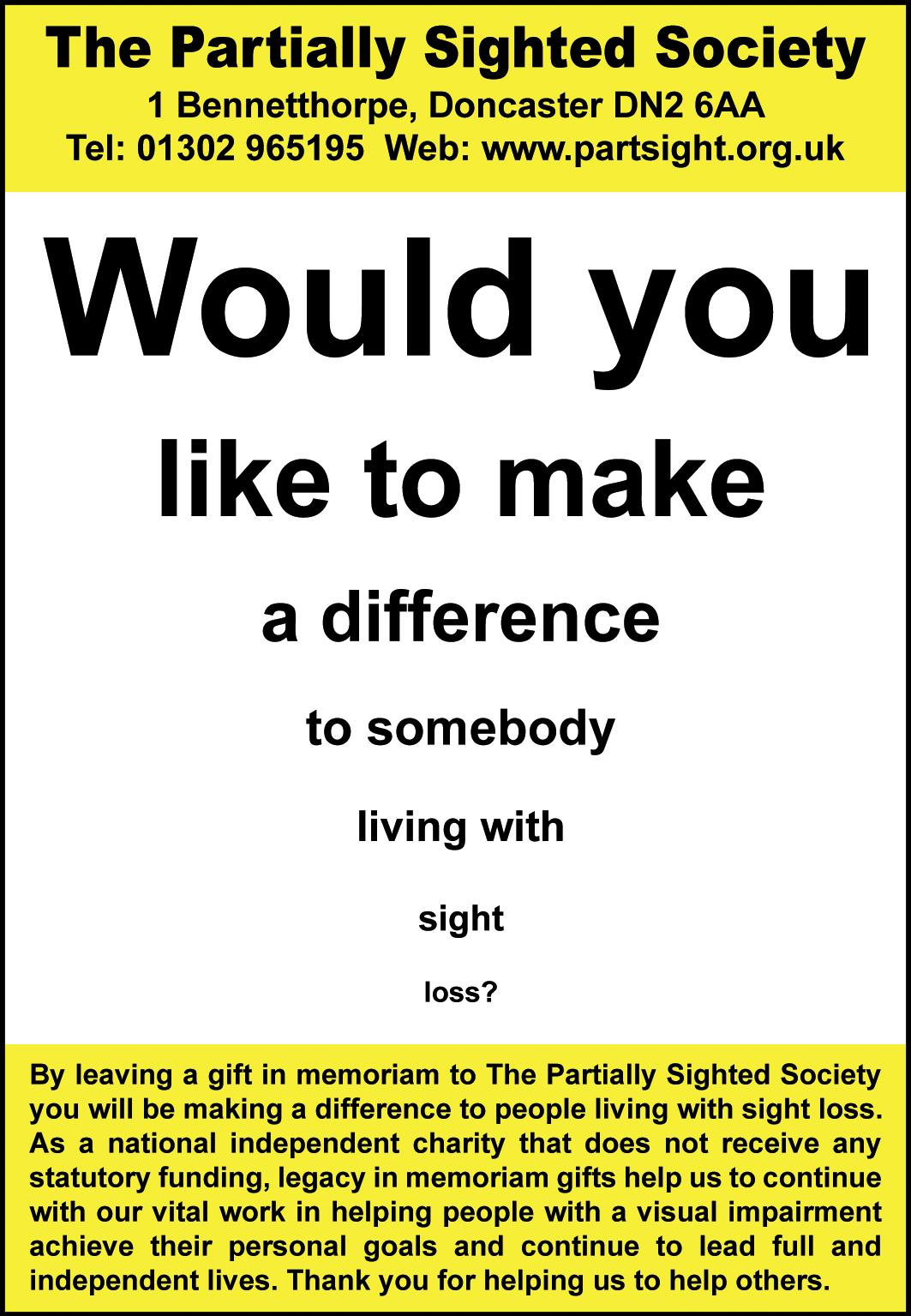

The society’s range of services includes the design, printing and provision of bespoke school exercise books for children, a specialist low-vision and sight test service, and the provision of aids and equipment to assist those living with sight loss to continue to live full and independent lives.
They are there to offer support for both the practical and the emotional impact of sight loss, by phone and in person. They also offer a range of social and support activities to alleviate the social isolation that comes with sight loss.
Leaving a gift in a will is a meaningful way of helping The Partially Sighted Society to help others. Legacies leave a lasting impact on transforming the lives of those living with sight loss. q
comprehensive and detailed advice for every stage of the following campaign.
The document can be downloaded for free from www.blackbaud.com/industry-insights/ resources
Other recent resources from Blackbaud include the webinar Three Top Tips to Improve Your Donor Experience and the UK Giving Focus report. Blackbaud also sponsored the recent Chartered Institute of Fundraising’s Fundraising Convention. q
45 45
COST OF LIVING FUND IS OPEN FOR APPLICATIONS
[THE DEADLINE FOR APPLICATIONS to the government’s Community Organisations Cost of Living Fund (CCLF) has been set at noon on 16 October.
The £76m package of funding, announced by the Department for Culture, Media and Sport (DCMS) on 24 July, aims to maintain and expand support for people and communities under severe pressure because of the increased cost of living, by distributing grants to critical frontline services seeing increased demand and increased delivery costs.
According to the DCMS, the fund will support frontline charities and community organisations struggling to meet increased demand for their
critical services, such as the provision of food, emergency provisions, shelter, safe spaces, warmth and financial or housing advice.

Minister for Civil Society Stuart Andrew said: “We recognise this is a tough time for families and businesses across the country, as they face rising prices and higher rents or mortgage payments. And during tough times charity and community organisations are at the heart of society, supporting people struggling through life with care and compassion.
“To deal with a sharp rise in demand resulting from cost of living pressures, we are supporting charities with £76m to enable these lifeline services to cope with the increased demand they are facing and continue their good work. This delivers on the Prime Minister’s commitment to support people with the cost of living and protect lowincome households from rising costs.”
The grants are being administered by the National Lottery Community Fund (NLCF). According to the NLCF, to apply an organisation must already run critical services around at least one of the following:
• Food and emergency supplies – like food and baby banks or the
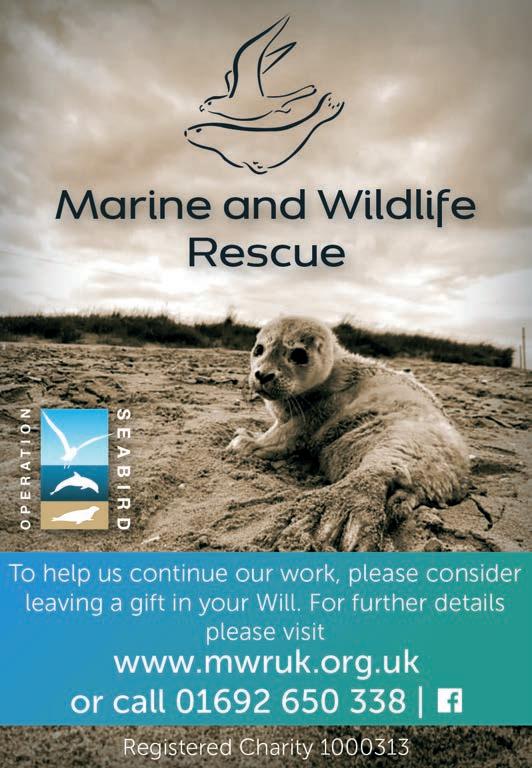
• provision of hot meals, clothes or toiletries
• Emergency shelter – like night shelters or other accommodation for
• people experiencing homelessness
• Safe spaces – like domestic abuse services and youth services
• Warmth – like warm rooms and spaces
• Financial and housing advice – like giving people advice because of the
• increased cost of living
The organisation must also be facing both increased demand for those critical services and increased costs of delivering them.
Organisations can apply for grants worth between £10,000 and £75,000 to cover project and core costs. That can include office rent, utilities, staff and volunteers. The grants run from now until the end of March next year, with the opportunity to gain retrospective costs of running the existing critical services they are applying for between 24 July and the date they are funded.
David Knott, chief executive of the National Lottery Community Fund, commented: “We are pleased to be working alongside DCMS to distribute this funding on behalf of Government through the Community Organisations Cost of Living Fund. This much-needed money will support charities and groups across England working under immense pressure to deliver critical services to communities struggling with the impact of the cost of living.”
The Community Organisations Cost of Living Fund is the first portion of funding from a total pot of £101.5m announced by the Chancellor at the Spring Budget. The remaining quarter of the funding, worth £25.5m, will be used to fund measures over the next two years to help the long term energy and financial resilience of voluntary, community and social enterprise organisations, as well as supporting the government’s commitment to meeting a net-zero target by 2050. Details on the application process will be announced later this year. q
46 46
ANIMAL WELFARE
Friends of the Animals 4/5
Tiggywinkles 6
Animal Action Greece 6
Three Counties Dog Rescue 7
Heartbeat Home for Horses 12
The Suffolk Punch Trust 12
British Chelonia Group 13
The Suffolk Owl Sanctuary 14
Edinburgh Dog and Cat Home 14
Remus Memorial Horse Sanctuary 15
Universities Federation for Animal Welfare 22
Humane Slaughter Association 23
Last Chance Animal Rescue 24
Isle of Wight Donkey Sanctuary 24
Wild Futures 25
The Horse Rescue Fund 30
Ferne Animal Sanctuary 30


Hope Rescue 31
Wales Ape & Monkey Sanctuary 36
The New European Distressed Donkey Initiative Ltd 37

Oak Tree Animals’ Charity 38
Hessilhead Wildlife Rescue 39
Paws2Rescue 40
Shire Horse Society 41
The Fox Project 42/43
The Pit Pony Sanctuary 44
Catholic Concern for Animals 44
Marine and Wildlife Rescue 46
MEDICAL RESEARCH
Prostate Cancer Research 1

The National Brain Appeal 2
Pain Relief Foundation 9
Caring Cancer Trust 10/11
Sight Research UK 16
Cancer Prevention Research Trust 17
Heartburn Cancer UK 18/19
The British Association for Cancer Research 20
MS Society 26/27
Brain Research UK 28
Royal College of Surgeons of England 28
CLEFT 32
FRAME 48
CHILDREN & YOUNG PEOPLE

Parenting Together 8
Kidney Kids Scotland 32
Hypo Hounds 33
HEALTH & DISABILITY
Blood Pressure UK 20
National Federation of the Blind of the United Kingdom 21
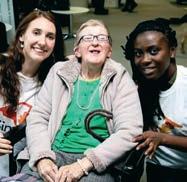

Paul’s Cancer Support 29
The Respite Association 34/35
The Partially Sighted Society 45

47 47
INDEX
The range of charities which depend on legacies to carry out their valuable work is a broad one. Those that are represented in this publication are listed below, grouped according to the area of activity in which they operate.
OVERSEAS AID
ZANE: Zimbabwe A National Emergency 28































































































































